#but I hope you liked it regardless!
Explore tagged Tumblr posts
Text
Chat Noir: Hey, my lady? Quick question: why was Argos multitasking during patrol and trying to solve a cryptex? He said he got it from you.
Ladybug, casually: Oh, it’s from my latest treasure hunt I made for him.
Chat Noir: …You give him treasure hunts? Why?
Ladybug: I still don’t totally trust him not to pull another ‘Red Moon’ incident so I figured if I give him enrichment, he’s gonna be spending his time solving puzzles and figuring out clues that take him all over the city instead of potentially becoming a supervillain again.
Chat Noir, who watched Félix spend several hours to solving riddles last night: …Huh. Does he know..?
Ladybug: 90% sure, yes. I don’t think he cares that much, he’s pretty invested in it and I’m great at creating complex systems with clues to follow so— it works out. Plus usually there is something to find at the end of the trail. Usually Kagami.
#WE’RE SILLY POSTING BABYYYY#Gotta keep the bird boy Enriched#he’s fine and pinky promises he won’t do it again but Ladybug likes insurance#And Argos likes puzzles so he’s fine with his arrangement#and Kagami gives him a kiss whenever he figures out the location so he’s happy#(Kagami will give him a kiss regardless but this way is extra fun)#This has been in my drafts since AUGUST#Bc I forgot I never actually posted it so. Oops#miraculous ladybug#marinette dupain cheng#adrien agreste#felix fathom#felix graham de vanily#SB Speaks#hope you like my newest silly post
5K notes
·
View notes
Text
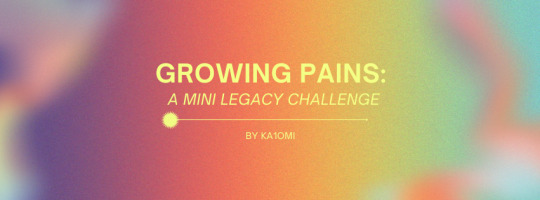
GROWING PAINS: A MINI LEGACY CHALLENGE by @ka1omi
i would first like to thank you amazing creators such as @thatssojordy @oshinsimblr @sashasspace @cocoelleansims @themintsimmer @alycemichelleee @ellesimsworld @simelune & many more for your amazing content and mods that make this game what it is.
@thatssojordy recently dropped a new mod called Growing Pains, which can be (and definitely should be) used in this challenge, and having immediately used it in game, it is honestly amazing and what inspired me to create this challenge. i've also been watching legacy LPs and just recently watched Inside Out 2 so this was born. it's nothing crazy, only 5 generations that can either be used in order or used as standalone challenges.
all packs are not required, however, they will enhance your gameplay as well as different mods that have been listed in the google doc. as this is my first ever legacy challenge i have created, please feel free to let me know on anything i can improve on or any changes that you would like to see or if you have any questions.
please please please tag me if you end up using this challenge, i would absolutely love to see all your beautiful sims and storylines!
THE OFFICIAL TAGS FOR THIS CHALLENGE ARE: #GPLegacy or #GrowingPainsLC
have fun!
this link is for the official challenge: google doc
this link is a checklist for personal use: google doc
#simblr#ts4#the sims 4#ts4 challenge#sims 4 legacy#ts4 legacy#ts4 gameplay#I AM ACTUALLY SCREAMING CAUSE I COULD NOT WAIT TO RELEASE THIS#i hope you guys like it im actually super anxious ngl#regardless let me know if you have any questions or anything#gplegacy#growingpainslc#its fact that I created a legacy challenge but I have yet to finish even two gens in my game
425 notes
·
View notes
Text

what the fuck is your problem
#transandrophobia#transandromisia#i use transandrophobia because i feel like it best covers both trans men and transmascs whereas antitransmasculinity only covers transmascs#but regardless thats just a profoundly fucked up thing to say and idk i hope you can get into therapy? (genuine)#jesus christ tho
267 notes
·
View notes
Text
Actual Ultimate Classpecting Guide
For real this time.
Buckle up, this is a really long one. For everything that's posited, I can provide textual evidence; that being said, I'm not going to be including the textual evidence within the essay itself, because it's already long enough as-is. As such, please feel free to ask for clarification or sources on any assertion, and I'll do my best to provide.
Before we begin, there's some things to discuss about how we're going to be approaching classpect in the following essay. In numbered list form for our short attention spans:
1. There is a concept Hussie talks about multiple times in his book commentary, "personality alchemy" - the idea that there are these "platonic ideals" of certain characters, which can be mixed and matched with others, in order to create new characters. The examples he gives are of how Eridan was a proto-Caliborn, how Kanaya has shades of Jade, how Nepeta was a proto-Calliope, and how Sollux and Eridan have shades of Dave in them. Classpecting is fundamentally a form of this personality alchemy:
2. Class describes the character's arc and emotional hurdles, while Aspect describes the character's base personality traits by which this arc is experienced.
3. For example, all three Seers struggle with hubris: Rose's need to be the smartest person in the room led to her being manipulated by Doc Scratch, Terezi's obsession with meting justice led to her engineering a situation where the only option was to kill Vriska, and Kankri's desire to be seen as a spiritual leader amongst his friends led to him furthering their divisions and harming them.
Then, when their pride is shattered, they cope by inflicting willful self-blindness: Rose turns to drinking herself stupid (the opposite of Light's sway over knowledge), Terezi gets down with the clown (the opposite of meting out Mind's justice, as it's a Gamzee W), Kankri goes celibate (Blood L) despite his clear romantic feelings for certain teammates.
4. As for Aspect: note how all three Life players share the personality traits of optimism, stubbornness, and obstinacy. All three Breath players share an immaturity and naïvety, and are quite frankly irresistible to people for some reason. All three Light players share a need for the spotlight and a tendency toward long-windedness and persnicketiness. So on and so forth.
What's interesting is, if you start analyzing characters that share Classes and Aspects, these specific types of similarity crop up over and over - all our Knights struggle with insecurities and facades, both our Bards have a crisis of faith. All three Breath players have an aspect of immaturity and childishness to their characters, and all three Light players are deeply concerned with appearing intelligent and feeling important.
5. As a result, this guide is NOT intended for classpecting real life people, because we are complicated, we contain multitudes, and we don't have arcs. This is primarily an analysis of what Class and Aspect mean in Homestuck based on textual evidence, because I genuinely believe that you can basically figure it out if you read carefully.
6. Duality, and the idea of "equal and opposite," are major themes within Homestuck - Prospit and Derse, Skaia (described as a crucible of birth and creativity) and the Furthest Ring (the literal afterlife). Which classes are involved in an Active/Passive split, and opposing Aspects, are the same way. This is the primary method I used to determine the Active/Passive pairings and opposing Aspects. After all, as Callie describes, both Thieves and Rogues are classes "who steal" - so, too, do I try to unify Classes by a common theme, even if they diverge wildly in how that theme is expressed (as Thieves and Rogues do). In the same way as the opposite of "up" is not "apple," but "down", because "up" and "down" are both fundamentally concerned with relative vertical position, so too can be defined concepts like Breath and Blood, Hope and Rage, Light and Void - as well as the reasoning behind Class pairings like Heir and Page, Maid and Knight, and Seer and Mage.
7. Descriptions for both Class and Aspect are left deliberately vague and up to interpretation within the comic itself, and this is by design: the actual manifestations of an Aspect can vary wildly given the Class, and even individual person, that it's tied to. Calliope even makes note of the fact that, under the right circumstances, someone can manifest effects that appear to be the opposite of their aspect. She's also careful to couch her language in "may" and "can" - because these concepts are intentionally somewhat nebulous and malleable. As such, while this guide certainly lays down what can be gleaned and inferred from the text, do note that Homestuck runs on a soft magic system, and as such, nothing stated is firm, 100%, must-always-be-this-way - just an overview of what we've seen.
8. There is often great overlap between Aspects, Classes, and Classpects - which Calliope herself notes. Heart and Blood are one of the most salient, as they both have a fixation on relationships, and Calliope mentions that under the right circumstances, a Classpect may even be able to manifest what appears to be the opposite of their Aspect. Again, Homestuck operates on a soft magic system, so this is a feature, not a bug.
ASPECT
There's a little less to say about Aspect, not because it's less complicated, but because "base personality traits" are much more nebulous compared to Class's sway over character arc. Still, Aspect represents the fundamental way a character is, and thus, color every interaction that character has. There's a reason Ultimate Selfhood is sought through Aspect, not Class - Aspect is the core of the character's being, what makes that person that person.
That all being said, Class has major sway over how an Aspect manifests, and certain classes can even invert the Aspect and even the character's role in the party. As such, these descriptions must be parsed carefully in relation to Class. Moreover, due to the soft magic system, there is at times overlap between unrelated Aspects, which can also be exacerbated by Class - Heart and Blood being the most obvious in this regard. Still, overall, you'll find the Aspects to be fairly distinct from one another.
Please also note that every Aspect can deal with its literal counterpart by default - Light players can wield lasers, Breath players can wield the breeze, et cetera. Because this kind of goes without saying, and because the non-literal stuff is more interesting to discuss, I'm not really going to go into too much detail about the literal qualities.
Finally, something interesting to note is that nearly every Aspect follows its own Hero's Journey cycle - full actualization for each one usually means reaching around to its opposite Aspect, and taking lessons from them - for example, Breath players need to learn maturity and responsibility, while Blood players need to learn relaxation and whimsy. Thus, an Aspect at its worst manifests in two ways - either a toxic overabundance of the Aspect's worst traits, or such a dearth of the aspect that it begins to resemble its opposite. Only by reaching into the opposite, however, can the player be tempered and reach full maturity - can they become more of who they are.
SPACE / TIME
Space and Time are both concerned with physical reality, goals, and the way one approaches them.
Space is associated with "the big picture" - with recycling, reproduction, and the interconnectivity of all things. The aspect also presides over the enjoyment of the journey over the destination - Space players serve as reminders that the present moment is as important as the end goal. Space is often a more passive Aspect, being the stage upon which the story is set. They're the hosts of the party, and the one who marks the ending.
Its players reflect these tendencies, often being feminine, with penchants for life-giving acts such as gardening. Their personalities tend towards frivolity and silliness, finding it difficult to stay on-topic or bring full gravitas to serious situations. Perhaps a better word would be "distractable;" when the aspect is so concerned with all things in connection with each other, it's easy to lose track of details, and it's easy to enjoy things simply as they come. Space players tend to be kind, patient, and forgiving, which is a strength as much as it is a flaw; it's easy for malicious actors to take advantage of this compassion, or for the Space player to find themselves in a poor situation by being overly permissive. They can easily be painted over by stronger personalities, and tend to struggle with romantic relationships, as they attract many with their kind and giving natures, and few are naturally so considerate of the Space player in turn.
"Passive" is a good word to use; at a toxic overabundance of their Aspect, Space players are trampled underfoot. They become enablers, servants to dark forces, or so lost in their own worlds that they neglect the one they live in. With their Aspect "inverted," a Space player becomes a demon of poor prioritization. Distracting not just themselves from their true purpose, but others, too, the Space player will wreak havoc by overemphasizing unimportant topics and ignoring important tasks. This superficially resembles Time, in that the Space player will become fanatically dedicated to their task, but note that the poor prioritization is still Space-esque at its core.
Still, within this nadir is a valuable lesson: the strength of self-assertion, and the determination to see a goal through. These will allow the Space player to weed their garden, separating good from bad, allowing it to flourish like never before.
Time, in contrast, is associated with "the little things" - with details, minutiae, and processes. Time presides over the struggle toward something greater, the endurance of hardship with an eye on the prize - the destination over the journey. Time players are the ones keeping track of the tasklist, marking off each item as it reaches completion; they are the tireless workers keeping the whole engine running.
Time players, thus, are ones whose lives are marked by struggle. They are highly goal-oriented; in contrast to how Space players can easily move from goal to goal, task to task, Time players feel bound to see things through to the end, finding satisfaction only when they've achieved their desired result - and only until they come across the next goal in their journey. A Time player isn't happy without a goal to work towards, a craft to polish, a prize to win - but this driven nature can easily be its own downfall, as it leaves little room for the player to admit to their own shortcomings, or ask for help from others. Moreover, their focus on minutiae can leave them blinded to the bigger picture, and it's easy for a time player to fall to despair, able to do nothing more but spin their wheels. They're prone to directionless anguish, frustration, and resentment towards the seeming futility of their actions, becoming destructive and defiant even when it doesn't serve them to do so.
At a toxic overabundance of their Aspect, Time players become explosively destructive. The ultimate "goal" of all things is death, with which Time is associated, and accordingly, Time players have a penchant for aligning themselves with futility and entropy, struggling so hard that their thrashing leaves a trail of annihilation in their wake. With their Aspect "inverted," Time players detach entirely - they can become so fed up with struggle that they simply opt to lay their weapons down and let the end take them. It's very easy for them to come to the conclusions that either everything matters, or nothing matters. This superficially resembles Space and its big picture thinking, but note that its framework of struggle, and whether or not a goal needs to be pursued, makes it a Time concern.
But the inherent meaninglessness of existence is, in itself, an important realization to make - that whether or not anything "matters" in the grand scheme, things can still be worth doing, worth caring about, and worth investing in. This realization allows the Time player to attack their goals with renewed vigor and greater clarity, which in turn means that the party becomes an efficient, well-oiled machine.
BREATH / BLOOD
Breath and Blood are both concerned with directionality, interpersonal relationships, and autonomy.
Breath is the Aspect governing freedom, liberty, and independence; it is a force that breaks shackles, clears out social norms, and refutes "the rules," whatever those rules may be. Breath players can't be tied down, whether by physical bonds, societal rules, or even the ineffable forces of the narrative itself. They are leaders of example, pioneers, and trailblazers, opening new paths for their teammates to follow.
Breath players are goofy and gullible, often with hearts full of childlike whimsy, naivety, and even immaturity. They are friendly and well-meaning, fond of simpler things, and easily swayed by others. They approach the world with a sincere and innocent good-naturedness, like a baby animal before it learns to be fearful of danger. Something about this sincerity seems to make Breath players irresistible to others, and they often find themselves the subject of romantic attraction. However, in this childishness is also the great pitfall of many Breath players - their natures are naturally conflict-averse, and egotistical the way a child can be, failing to see beyond themselves. They can be incredibly callous when not considering the consequences of their actions, or the viewpoints of others.
At their worst, Breath players are irresponsible and callous. They'll shirk the consequences of their actions, blaming anybody but themselves, or simply choose not to care who they hurt in order to get what they want. They may even choose to stop making choices for themselves, leading to the "inversion" of their Aspect - a voluntary loss of freedom and independence, derived from an Breath-like aversion to responsibility, which superficially resembles the bondage of Blood.
But if they are able to overcome these tendencies, a Breath player will learn what true responsibility looks like - responsibility for themselves, their choices, and the effect they have on others. Armed with this, a Breath player's ability to break bonds can be focused into a clear force for good, clearing away all obstacles and harmful societal standards, leading the charge into something new and beautiful.
Blood, in sharp contrast, is the aspect that governs bondage, contracts, and interdependence. It is a force that binds. Under Blood's sway are not only romantic entanglements, but familial, friendly, and societal ones as well. This aspect sees overlap with Heart, but the division is this: Heart concerns itself with feelings, and Blood concerns itself with compatibility. Blood players are diplomats, forces that remind us all that we are more similar than we are different, and that that similarity should bring us together when we are on the verge of pulling apart.
Blood players, reflective of their Aspect's association with bonds, tend to be neurotic and obsessive. They have a tendency to over-examine and overthink, constantly fretting over the infinite and infinitesimal variables that influence the shape of society and interpersonal relationships. However, this judgmental nature stems from a deep well of idealism and empathy; Blood players can't help but care about others and wish for the best for them. In a way, this makes them one of the most mature members of the team, being concerned with its overall well-being. Unfortunately, their prowess does not extend inwards, and their assessment of themselves is usually direly incorrect - all the worse because Blood players always feel responsible for those around them. Blood, being the Aspect concerned with interdependence, is the weakest one when all alone.
Thus, it's easy for the Blood player to wind up controlling - desperate to make sure everyone is moving according to their vision, they'll become iron-fisted dictators, with a "my way or the highway" approach to social interactions. It's easy for them to wind up pariahs of their own making, becoming so critical of others, or so adamant about enforcing their own will, that they inadvertantly sever their ties - something that superficially resembles Breath's independence, but is truly a result of Blood's neuroticism.
But with that space and separation can come great clarity. Blood players must learn to relax their grip, and allow people room to breathe - including themselves. Once able to grasp that sometimes bonds must be forged with a soft touch, Blood players' natural empathy shines through, allowing them to build something so much kinder and greater than the sum of its parts.
LIGHT / VOID
Light and Void are both concerned with knowledge, ontology, and "narrative relevance".
Light (as well as its counterpart) are perhaps best understood through the lens of "narrative" - this idea that, of all things that do and don't exist, and all events that do and don't happen, only the ones put to page are "relevant". Thus, Light is associated with knowledge and luck - that is to say, it's associated with the knowable, the objective, and the concrete, and the ability to determine "important" events. Light players have read the book they're participating in, and able to serve as luminary guides from one plot point to another, lighting the lampposts for others to follow.
Light players, naturally, are erudite and educated, possessing keen intellects and cunning minds. They are fond of knowledge itself, of markers of status and prestige - whether that's wealth, the adulation of the masses, or a massive library. They harbor a desire to be important, to be seen, to be acknowledged, and are happiest when they are looked up to. Conversely, they deal poorly with being looked down upon. Their confidence transmutes easily into hubris, and they struggle with having that pride challenged. As such, they tend to be volatile and unpredictable, quick to retaliate against those who threaten their egos, or obsequious to those whose acknowledgement they desire.
Their desire for the limelight can quickly spell disaster - they can become incredibly cruel, harsh, and egotistical in their pursuit of narrative significance. They forget, in their obsession, that they, too, are fallible and flawed, and the inevitable reminder can come very harshly. Light players struggle with moderation, and as such, when they feel shame, they'll often take drastic measures to cope with it - deliberately darkening their own influence or intellects, removing themselves from the "story" entirely - something which superficially resembles Void's penchant for the background, but which is firmly rooted in Light's obsessive need for drama.
But in experimenting with narrative insignificance, Light players can reach an epiphany - in their absence, others may shine, and that can be a wonderful thing. Light players, then, can learn to shine not just for their own sakes, but for the sake of others, allowing them to weave a story even more brilliant than any that can be weaved alone.
Void, in contrast, is the blank spaces between the words. That which is secret, subjective, unknowable - these are Void's domain. It's associated with taboos and hidden things, sexuality and pleasure. It's also associated with the empty canvas - the blank space before creation, and the oblivion to which creation is eventually destined for. Thus, it stands for infinite possibility, though the collapse of those possibilities into a reality removes that reality from Void's domain.
Thus are Void players ever cosigned to the background, though this generally suits them fine. Void players are very self-possessed. Where Light players tend to exaggerate and complicate, Void players are honest and simple, preferring straightforward solutions. They don't tend to think very hard, instead letting intuition and emotion guide them to where they want to be - which makes them one of the more stable personalities on a team. However, this simplistic, feelings-driven approach often leads to pleasure-seeking behavior, poor impulse control, and overindulgence in vice, and from there, to irrelevance, with which Void is so closely interlinked.
Void players are especially prone to vice, and at their worst, will become so drunk on pleasurable activities that they pursue them to the active detriment of the party's goals or the Void player's self-improvement - making them the ultimate irrelevant character. They can also very easily drag others into their mélange, with a forcefulness that resembles Light's illuminating guidance, but which is ultimately rooted in Void's pursuit of personal pleasure.
But there's a lesson to be learned in Light's domain: how to bring themselves into relevance and greatness. A Void player, once they learn to pursue not just personal pleasure, but a greater satisfaction for the collective whole, can drag the Void behind them, kicking and screaming, to where it'll be of use.
MIND / HEART
Mind and Heart are concerned with what it means to be a sentient being, with identity, and with why we do what we do.
Mind is the Aspect associated with logic, rationality, karma, ethics, and justice. To a Mind player, they "are" because they "think". They are keenly aware of the consequences of every action, and well-versed in cognition and behavior, such to the point of manipulating others with ease. Deeply concerned with the "effect" of cause-and-effect, Mind players are always cognizant of debts and credits, where justice is owed and where it has been over-meted, and their subtle machinations culminate, like well-placed dominoes, in grand and explosive finales.
Mind players are schemers - it's in their nature. They have a tendency to view the world as a puzzle or game, with themselves and the people around them as pieces on a board, and set as their standard rules the laws of ethics and karma - owed debts and overhanging credit - guilty and innocent. Mind players are wickedly cunning, and have an high success rate with every scheme they commit themselves to, but the grand downfall of all these tendencies is that they tend to lack in a sense of identity, and have a poor grasp on their own emotions or desires. While they may know how to provoke a desired reaction, they don't know how to change someone's mind. They often find themselves grappling very painfully with their own selfhood, with feelings of emptiness, inadequacy, or uncertainty.
Thus, a Mind player at the worst zenith of their Aspect is heartless and cruel. Leaving no space for empathy or even personal feelings in their plans, the Mind player will plot for an ending as heartless as they are. But a Mind player is never truly without emotion, and ignoring their own feelings causes them to manifest in terrible ways - Mind players have a tendency to seek toxic, codependent relationships, hoping to find external validation, subjecting themselves to the wishes of others, which can appear like Heart's fixation on feelings and desire.
But in recognizing their own need for emotional validation, and the importance of their own feelings, a Mind player can realize that there's an entire dimension to the game they've been playing that they've been ignorant of. When a Mind player learns to temper their schemes with empathy, compassion, and kindness, how much more success they'll see - and how much happier that grand finale will be!
Heart, then, is associated with feelings, motivations, intuition, the soul, and the self. To a Heart player, they "are" because they "feel" like they are - and they're keenly aware of the multitudes that are contained within themselves. Deeply concerned with the "cause" of cause-and-effect, they're drawn to desires, those of themselves and of others, especially where strong feelings are concerned. Heart players are gifted with an intuitive understanding of those around them, both their good and bad qualities, and are tasked with the grand task of bringing out the best.
It stands to reason, then, that Heart players have a firm grasp on who they are and what they want. For the same reasons, it's difficult for a Heart player to truly hate or condemn another person, because they are so adept at understanding them. However, this understanding comes with a price - because the Heart player is so aware of themselves, they can't escape their own worst traits - nobody self-loathes as accurately as a Heart player can. Nor can they ever truly be untruthful with another, making them poor manipulators. Capable of presenting a different facet of themselves as the situation calls for it, certainly, but just as it's impossible to lie to a Heart player, who always knows how someone really feels, it's impossible for a Heart player to lie to themselves.
With this sincerity comes vulnerability. Heart players wear theirs on their sleeves, and at their worst, this can make them demanding, needy, and sensitive - so eager to connect with others emotionally that they'll cramp themselves to fit others' desires. But they can't ever keep this up for long; Heart players have a tendency to withdraw from others after being hurt too often, finding it easier to be alone and silent about their feelings than to deal with the pain of rejection. They may even work to manipulate others, preying on their emotions and desires to force them to act in their worst interests. This superficially resembles Mind's cold logic, but unlike Mind's cool rationality, Heart's aloofness is a mask, an attempt to avoid pain by pulling away.
But this isn't purely a negative, because a Heart player can learn a healthier form of detachment, and separate out healthy and helpful desires from harmful and detrimental ones. Given this clarity, the Heart player becomes the team's emotional core, able to raise up each teammate's best qualities, while helping them deal with their worst, enabling everyone to be the best possible version of themselves - which the Heart player knew them to be all along.
LIFE / DOOM
Life and Doom are concerned with outlook, with journeys, and with trials and tribulations.
Life is an aspect concerned with healing, growing, and improving. It is associated with beginnings, optimism, and positive emotions. The very essence of Life lies in its healing abilities, in this idea of overcoming the odds and triumphing over hardship and difficulty. Life is action, movement, and motion, and its players can scarcely hold still. Life will find a way - and Life players harbor the same immutable belief; they are the most stubborn weeds in the garden, the cockroach that survives the apocalypse, and the beating heart that refuses to stop.
Life players tend to be optimistic and confident. They are self-assured individuals, with a stubborn belief that good things are on their way, and any hardship they face is not only temporary, but something that can be overcome. They can find the silver lining in any cloud, and enjoy themselves under any circumstance. They love to nurture, to care for others, though this love has a tendency to be one-sided. Indeed, Life's stubborn nature is its players' greatest pitfall; their persistence easily becomes obstinacy, and their confidence can become condescension. Their self-assured nature easily becomes egotism, and they can have great difficulty grappling with those who don't share their views - even coming to oppose those who bring emotional pain and suffering that can't be easily fixed.
It's very easy for a Life player to decide another person isn't worth their attention, and opt to leave them behind - after all, Life has to move forward, no matter what it tramples in the process. At their worst, they're stubborn to the point of not listening to anyone but themselves, confidence becoming blockheadedness. This focus on forward progress without looking back can even cause Life players to become harmful to others, so focused they are on their own growth that they don't notice that they're choking everyone else out. This may resemble Doom's death in its worst case - arresting everything else, eventually blocking even their own path with unruly, out-of-control fecundity.
Thus, a Life player needs to learn to more gracefully accept Doom's influence - to pause, slow down, and consider viewpoints that are negative, unpleasant, or difficult. A Life player, endowed with moderation, will be able to cultivate a bountiful garden, rather than an unruly jungle - a place for all to flourish and live in plenty, never wanting for anything.
Doom, then, is the aspect concerned with death, with rest, and with endings. Doom is associated with suffering and with negative emotions, with peace, with sleep, and with dreams. Doom players have a natural penchant for prophecy, and are often dual dreamers, able to take advantage of both Skaia's oracular clouds and the Horrorterrors' voices over Derse. All things must eventually come to an end, and not all times will be good; in these troubling times, Doom players shine, as they are the guides who call the murk home, and know best how to navigate rough waters, course-correcting until the storm passes.
Doom players tend to be deeply pessimistic. They experience, to a much more magnified degree than others, negative feelings and impulses, and it's difficult for them to see the world without seeing its flaws, first and foremost. They are not healers, but commiserators, those who understand greatest that sometimes there's no way to deal with tragedy but to simply sit with it and wait for it to pass. The counterpoint to Life's insistence on breathless positivity, Doom is a reminder that pain, grief, sadness, shame, and guilt are not unnecessary things - in fact, excising them can lead to terrible consequences. Doom players are the universe's martyrs, often taking it upon themselves to course-correct, to sacrifice themselves in order to give others a chance to continue on, to avert a terrible fate.
Unfortunately, this tendency also brings with it a tendency for Doom players to wallow in misfortune, or worse, to take themselves out of the picture, giving up entirely on seeing a better ending. As if energized by their own sense of futility, a Doom player at the "inverse" of their aspect may seem to echo a Life player's focus on forward progress and motion, actively spurring their team on towards an untimely demise.
A Doom player must learn to harness this sense of progress for good, rather than harm. A Doom player, once able to grasp the joy of life even in the greatest depths of despair, will be able to fill even the darkest hours with peace, meaning, and hope.
HOPE / RAGE
Hope and Rage are concerned with permission, and are the lens by which we define reality.
Hope is described by Hussie in the book commentary as being "framed as the most powerful aspect" because it is, literally, an aspect that defines reality. Its specific ability is lies in reducing the "fakeness attribute" of something, thus making it "real". Hope is associated with convictions, with idealism, with faith, order, holiness, and, of course, with magic - which Hope turns real. Hope is permission itself - a reality-breaking ability to look at the world and decree that it must be another way, a way in which the Hope player believes it ought to be.
Thus, Hope players tend to be hard-headed zealots, with no self-awareness whatsoever. Their inclination towards powerful beliefs makes them very difficult to dissuade from a path they've set their minds to, and their specific suite of abilities makes them terrifyingly likely to make their vision come true. Hope players are usually not particularly cunning, nor particularly intelligent, nor even particularly empathetic. Given the Aspect's focus on conviction and faith, it's usually very difficult for Hope players to notice anything occurring beyond their own minds and feelings. Thus are Hope players hopeless optimists, hopeless romantics, and hopeless in general - often great sources of embarrassment to their teams, as their naked sincerity is painful to witness. However, their ability to define reality does not leave them when their beliefs are faulty (which they often are, given Hope players are not particularly introspective, either), which is what makes a Hope player so dangerous.
A Hope player can easily be set on the wrong path - as convicted as they are, and as difficult to shake from that conviction as they can be, Hope players can easily march down a path of destruction, if not persuaded with a deft touch and gentle guidance. In the event that their faith is broken, Hope players easily become despondent and lost, floundering and wishy-washy, which superficially resembles Rage's self-consciousness, but is truly just a lack of direction.
But Rage has a powerful lesson to teach Hope players - that of questioning themselves, interrogating their own beliefs. Once their convictions have gone through rigorous scrutiny, revised into the best, brightest versions of themselves they can be, a Hope player is a worker of miracles - speaking into existence a beautiful future on faith alone, proclaiming that how they see the world is how the world shall be.
Rage, then, is the power of denial. If Hope reduces the "fakness" of a thing, then Rage reduces its "realness". Rage, too, is a means of defining reality, in this case taking a torch to the aspects of reality that it rejects. In more passive Classes, this works in subtler ways, stoking others towards destructive fury. Rage is associated with anarchy, chaos, revolution, destruction, anger, and nihilism. A Rage player will not suffer a world that does not satisfy them, breaking it to pieces, such that something new can take its place.
Therefore, Rage players are prone to harboring anger and resentment, discontentment with the status quo, and faith only in that what currently exists must somehow be dismantled. However, unlike Hope players, who can't help but be pathetically sincere, Rage players are incredibly self-conscious, and often try to mask and hide their embitterment and anger. This, ironically, leads to further ostracization, as others can tell they're being inauthentic. This only further compounds their sense of alienation, and drives them further into smoldering resentment. This makes Rage players sound volatile and dangerous, and they are - but the same fury that moves them is the fury that ignites revolts and tears down oppressive regimes, a necessary and vital well of energy and momentum. It takes careful handling to ensure that the team's Rage player can channel this energy towards righteous causes, rather than marking all as a target for their destructive ire.
In the worst-case scenario, the Rage player turns that rage out indiscriminately, deciding that there is nothing worth fighting for - only unpleasant things to be brought to ruin. This is Rage at its toxic overabundance. Conversely, a Rage player can retreat so harshly into their mask that they allow others to dictate their beliefs, taking them to heart - an action motivated by Rage's destruction (this time, turned inwards) that superficially resembles Hope's convictions and faith.
The true path for a Rage player is a healthy balance - to allow themselves some of Hope's sincerity, and by doing so, to become more sincere and true. This will let them release the pressure of their mounting ire, such that it can be converted into productive, rather than destructive, energy - the heralds of a revolution, razing away the faulty, corrupt old systems such that something better and new can take their place.
CLASS
As previously stated, Class governs a character's character arc - the character's starting circumstances, whether their conflict is primarily internal or external, and what major aspect of their Aspect becomes a hurdle for them to overcome.
In the same way an Aspect's sways tie into the character's base personality, the character's Class abilities tie into the kinds of struggles they face, and have great influence on how their Aspects manifest.
That being said, a character - and their Class - are always subject to their Aspect, as their Aspect is tied fundamentally into who they are. Thus, it can be said that a Light player will always have an affinity for knowledge and provide Seer-esque guidance even when not in a Seer role, a Doom player will always have prophetic abilities even with a non-prophetic class (note that Mituna, an Heir, still had prophetic visions, despite those generally being the realm of Mages and Seers), and a Life player will always have a penchant for healing, even paired with a destructive Class like Prince or Thief (the Condesce, after all, could still extend life; a Prince of Life would likely manifest not as one who causes plants to wither and die (this would actually suit a Prince of Doom), but one who destroys in the way of nature overtaking an abandoned shack, or a forest breaking down a body).
This means that when a character's Classpect inverts their Aspect, it doesn't mean that they suddenly become a hero of the opposing Aspect - rather, it means that, at their very worst - at the nadirs of their character arcs - they will lean so much into their Aspect's worst traits that it will superficially appear as the opposite, when all it really is is an absence of themselves. Dave, a Time player, usually so attentive to detail (despite his disaffected facade, he's always paying rapt attention to Karkat's rants, and noticing all the clues pointing to his destiny of defeating LE), at his lowest emotional point (arguing with Grimbark Jade after sobbing about his lost childhood whimsy), states that he doesn't think Lord English is that big a deal, and never even did anything directly bad to him or his friends - when he was literally directly haunted by LE via Cal his entire childhood. Similarly, Rose drinks herself stupid in order to cope with her mother's death.
Note how, superficially, this almost appears to be an invocation of Space's "big picture thinking," its passivity and permissibility, or how Rose's case appears to be Void's tendency to indulge in vices and pleasure - but they're not. Time's worst traits superficially resemble Space, Light's resemble Void, and vice versa - Grimbark Jade is the Condesce's taskmaster, and Porrim at her worst was as much of a nag as Kankri, trying to do a Time player's managerial job. Horuss and Equius at their worst won't shut up and won't stop talking over their partners. So on and so forth.
Finally, Calliope tells us a couple things about Active/Passive pairings. The first is that Calliope introduces the idea of paired classes with the idea that both Rogues and Thieves "steal" (and later, that both Princes and Bards "destroy"). This presents the idea that both classes can be roughly summed up with the idea that every pairing can be summed up with a common theme.
The second is her description of what makes a Class Active versus Passive - that Active Classes move their Aspect to benefit themselves, whereas Passive Classes allow their Aspect to be moved in order for others to benefit. In a way, they're like active and passive voice in grammar (to tie in with the way Classes and Aspects are so tied to ideas of narrative and character arc) - an Active Class performs their Aspect, and a Passive Class allows the Aspect to be performed "by others" (the famous piece of advice regarding telling the two apart being that a sentence written in passive voice can have "by zombies" tacked to the end of it - eg, John is attacked "by zombies", as compared to active voice - John attacks).
Thus, the Class pairings, along with their basic themes, are as follows:
KNIGHT - / MAID +
"One who controls."
Knights and Maids are paired together through two key factors: the first is that they both hold leadership or managerial roles; the second is that both classes carry the connotation of serving a Lord. Fittingly, they are both struggle with the control of malicious forces - Knights with prophecies indicating their role as heroes, Maids with direct usurpation by malicious forces.
PAGE - / HEIR +
"One who inherits."
Pages and Heirs are paired together because they both fundamentally deal with the great inheritances placed before them. Pages can come into incredible, limitless power - but they must struggle and work hard for it; Heirs begin the game in societal comfort and wealth, and must learn to defect from their decadence.
THIEF - / ROGUE +
"One who steals."
Thieves and Rogues are highly adaptable, as Thieves are capable of fantastic on-the-fly adaptation, whereas Rogues have an infinite toolbox at their disposal. They are both provocateurs, shakers of the status quo, though the Thief does so for personal gain, while the Rogue does so to right injustice.
MAGE - / SEER +
"One who guides."
Mages and Seers are tied together by the gift of prophecy and future sight. Seers are privy to the endless branching paths that the future may take, while Mages are gifted with the ability to outright determine a future that will certainly happen, appearing to be prophecy.
WITCH - / SYLPH +
"One who changes."
Witches and Sylphs are individuals blessed with great magic, but poor judgement. Sylphs heal and nurture, but are drawn to those with strong desires, and enable them to cause great harm; Witches, meanwhile, possess strong emotions, which they often use as moral guidance, for better or worse.
PRINCE - / BARD +
"One who destroys."
Princes and Bards are representatives of society - the one who determines its course, and the one who recounts its passing. Princes suffer from a toxic overabundance of Aspect, and are prone to spectacular meltdowns, whereas Bards are always poised for a crisis of faith. Both are responsible for catastrophic failures - but also breathless victories.
INDIVIDUAL CLASSES
KNIGHT
"One who controls [Aspect] or controls using [Aspect]."
Knights are frontline warriors, rallying points behind which the party falls into line. Although they are often leaders, just as often, they are logistical planners, strategists, or simply the team's beating heart. They are almost always thrust into positions of narrative significance, often carrying grand destinies or even outright heroic prophecies on their shoulders. The are the party's rallying force, its center, and a guiding light - the one to lead the charge, behind which the party will follow.
The primary character struggle a Knight will have is with crippling insecurity. Knights are prone to self-loathing and imposter syndrome, and will often adopt a façade in direct opposition to their aspect (ie, their fundamental personality) in order to cope with their feelings of inadequacy. Thus, their relationship with their aspect becomes love/hate - though they're naturally drawn to their aspect, and even naturally skilled at utilizing it, they have a tendency to become their own worst enemy, as their insecurities make them push their façades, and their façades distance them from their aspect.
"Controlling their Aspect" means that the Knight has easy access to their Aspect, wielding it like a tool or weapon - for good or for ill; "controlling using their Aspect" is what grants Knights their leadership abilities, able to dictate how others ought to act in accordance with the Knight's Aspect - whether their understanding of their Aspect is high or low, whether their advice is good or bad.
Therefore, at their worst, a Knight will fall prey to their insecurities, retreating into their facades, rejecting their Aspect, which will allow disharmony or misuse of it to proliferate throughout the team. They may even wind up deliberately twisting their Aspect's presence within the team so that they never have to be confronted by it; these distortions ripple outwards and eventually culminate in major catastrophes, all on account of the Knight's negligence.
But at their best, a Knight is a shining beacon and guiding light; when they come to terms with themselves, and allow themselves to be comfortable in their own skin - when they no longer allow themselves to be ruled by their insecurities and anxieties - they ensure that their aspect is harmonious wherever it appears throughout their party, and can wield it expertly as a weapon, as if it were their own flesh and blood.
MAID
"One who allows control through [Aspect] or allows [Aspect] to be controlled."
Unlike Knights, which take positions of frontline prominence, a Maid is a managerial presence in the backlines, though no less crucial for the smooth functioning of a party. Just as the invisible hands of the hired help keep a household running, the Maid will be called upon to provide vital services to keep the game stable, even if those services are more noticeable by their absence than their presence. Maids are often the party's unsung heroes or even shadow leaders, tugging at invisible strings, fingers on the pulse.
A Maid's primary character struggle will be that of escaping oppression. Maids tend to start the game in positions of subjugation or subservience, especially to malicious forces, and their abilities often end up being exploited to serve their masters' ends. Therefore, one may even have the impression that a Maid is ruled by their aspect, held prisoner and slave - at least until they're able turn the tables.
"Allowing their Aspect to be controlled" means that Maids are capable of directly dispensing their aspect unto others - a Maid of Time can dispense time unto foes, pausing them in their tracks; a Maid of Life can grant so much life that they can revive the dead. Their boons are great and direct, straightforward in a similar manner to Knights. "Allowing control through their Aspect" grants them their uncanny managerial abilities, as their aspect dictates the realm in which nothing occurs without the Maid's knowledge or permission, a realm made available to whomever the Maid's allegiance lies with.
Thus, at their worst, the Maid becomes a saboteur. Exploited by malign forces, their abilities to allow control over others through their aspect, or control of their aspect, makes them perfect vehicles by which their aspect can be hijacked or usurped, and made to turn against the party, and they often find themselves placed into these positions through no fault of their own. It takes the party banding together to shake off the forces that would keep a Maid in bondage.
However, at their best, Maids ensure that the party can never go too far off the rails. There is a place for everything, and everything will be in its place; a Maid is a supply line, a safe haven, and a promise that everything will be neat and tidy when the party returns from war. When the Maid belongs to themselves, their homestead becomes a fortress, and nothing occurs under the Maid's watchful eye without their express permission.
PAGE
"One who works to inherit [Aspect] or inherits [Aspect] for themselves."
Pages are a class defined by promise. As the name suggests, a Page begins weak, but has the great potential to develop into one of the most powerful players in the game. The exact nature of a Page's powers are vague, not because they are insignificant, but because they are so great that it's difficult to encompass them all. At the apex of their arcs, Pages are capable of miraculous feats, overpowering even Lords and Muses - if only they could reach that point and stay there.
A Page begins the game weakest of all, reflective of their long journey of growth. Where most classes only fall into deficit of their Aspect at their lowest emotional points, Pages begin their arcs in deficit - exhibiting character traits opposite to those their Aspect normally encompasses. Moreso than any other class, a Page must learn to grow into their Aspect. Weak-willed, naive, and easily hurt, Pages require careful nurturing if they're to come into their own.
"Working to inherit their Aspect" describes the endless journey of growth the Page must undertake - one with many missteps, backslides, and setbacks along the way. Still, they "inherit their aspect," meaning that their full potential, when realized, is overwhelmingly great - practically becoming their Aspect in humanoid form, capable of utilizing it to its glorious full potential.
However, their nature defeats them, and even if they can attain this state, the Page usually can't stay there for long. At their very worst, the Page's deficit of their Aspect's better qualities can turn the Page into a gravitic well of misfortune - an albatross about the party's neck, the centerpoint, if not inciting incident, of a massive disaster, as their team is sucked in by the Page's natural weakness.
But this is only true as it contrasts to a Page at their best - having grappled and won with the greatest of all weakness, a Page is poised to come into the greatest of all strength. Shown kindness, compassion, and support, a Page at full power reflects a party at their best. A Page at full strength is breathtaking to behold, an unstoppable force of nature, their Aspect made manifest.
HEIR
"One whom [Aspect] grants inheritance or inherits [Aspect] for others."
Heirs, in contrast to Pages, start the game strong. They usually belong to the upper echelons of their respective societies, a position of great wealth, leisure, and comfort, and are set to be inheritors of even greater wealth. Similarly, their Aspect comes to them as if of its own will - it is powerful, but difficult for the Heir to control, reflecting the wealth and status they've enjoyed as birthright.
An Heir's main challenge is that of examining their privilege, and learning where they wish to spread the gift they've been given. Because of their positions of sheltered comfort, Heirs are not particularly world-wise, and often harbor massive blind spots to the suffering of others and the ills of society. As such, they tend to be fairly aimless, given great power but no strong motivations, and have a tendency to simply indulge in their Aspect without contributing great help or hindrance to their team at all.
The Heir's Aspect is practically an independent entity. Being one whom "their Aspect grants them inheritance" refers to how the Heir starts powerful, able to summon their Aspect to perform great, miraculous acts. However, it is highly intuitive and difficult to control. The Heir's challenge lies not in attaining great power, but in attaining control over, and the ability to direct, their existing abilities. Once they do, they can "inherit their Aspect for others" - Heirs become a conduit through which their party can experience their Aspect, making it a usable pool of wealth for them all to draw from. However, because of their comfortable positions, many Heirs end up dallying, finding no pressing need to do so.
But this dallying hides a ticking clock. An Heir's inheritance will come to them, one way or another, and if they aren't ready to receive the great responsibilities that come with such great power, then the power will eventually consume them. An Heir with no clear direction will eventually become lost to their Aspect, entirely removing both from play. Like how wealthy inheritors simply become part of the status quo, so, too, does an Heir disappear into their Aspect, fixing it in place.
Thus, Heirs must learn where they have been blind, where they have been foolish, and what it means to be underprivileged. Then, once they turn their energies towards addressing those injustices - to taking responsibility for building a better future - when their wealth comes to them, they'll be able to distribute it where it's needed most. An Heir, fully-realized, brings their Aspect to heel, and makes it a resource available to their entire team, as if welcoming them all into the family.
THIEF
"One who steals [Aspect] or steals using [Aspect]."
Thieves are, as the name suggests, greedy - much of their arc revolves around a desire to amass wealth, though what's considered "wealth" varies based on the Thief and especially their Aspect. They tend to be callous people by nature, capable of ignoring or trampling over the feelings of others in order to take what they want, in the hopes of filling an emotional void the Thief may not even be fully aware of.
The Thief's playstyle is one of careful resource management. Reflecting a natural tendency to take "wealth" from others, Thieves are unable to use their Aspect without first "stealing" it - a subtractive act which leaves the victim bereft of the Aspect, weakening them in the process. Because of the finicky nature of these abilities, it takes great cunning to be a Thief, and the Class both demands and requires the player to be adaptable, flexible, and quick on their feet, able to effect complicated schemes and engineer the perfect situations for their powers to have the greatest effect. Thieves aren't necessarily strong, but they have a very high victory ratio, because they're experts at turning a situation to their own advantage.
"Stealing their Aspect" refers to the fundamental way in which the Thief class is played, this resource management game; "stealing using their Aspect" reflects how the Thief often becomes a malignant force within the party, viewing their own teammates as caches of wealth to plunder. Thieves are naturally prone to hurting others for their own purposes, craving drama and attention, and being of such callous dispositions that they're able to perform extreme acts of cruelty given the right motivations.
Thieves often become a target of ire within the party, disruptive forces whose quest for personal wealth and fulfillment comes at the cost of those around them. At their worst, they can bring so much heat down upon their own shoulders that the party feels the need to treat them like an enemy, which is disastrous for party harmony. Moreover, it's disastrous for the Thieves themselves, as Thieves seek wealth to compensate for some emotional emptiness, and making enemies of their friends only serves to deepen their ennui.
Thus, a Thief must be taught that true happiness and fulfillment doesn't come from the struggle for wealth, but from the building of something better with those they care about. A Thief, thus turned to heroic purposes, becomes the party's pinch hitter - an adaptable spy, an unpredictable maverick, an element of surprise - and above all, a reliable ally, capable of turning any tide in the party's favor.
ROGUE
"One who steals from [Aspect] or steals [Aspect] for others."
Rogues, on the other hand, call to mind such figures as Robin Hood, stealing from the rich to distribute to the poor. Rogues are at their best when they're agents of a well-planned heist, as they possess an unlimited toolbox - their own Aspect - to play with. Their Aspect is a treasure trove, just waiting for the Rogue to plunder it and share its riches - if only the Rogue can figure out how.
Rogues are forces of revolution. They naturally carry a rebellious spirit, one which bristles at injustice, takes a stand against authority, and questions the status quo. Their ideas are unfocused, however; they know they must rebel, but usually don't start with a clear idea of against who or what. They know that their society is injust, but they don't know how to address that injustice. They know there are villains, and may even know these villains' identity, but they don't know how best to defy them. In a similar way, they're often lost as to how to utilize their Aspect beyond its most basic applications, and usually require external assistance in order to bring out its full potential.
Rogues' true potential lies in "stealing from their Aspect" - an additive act, rather than a subtractive one, as a Thief's stealing is. Rogues are capable of removing their own Aspect's sway over another entity, allowing it to exhibit the characteristics of the opposite Aspect; a Rogue of Void can create things out of nothing, a Rogue of Heart can tease out behaviors and actions. They can also "steal their Aspect for others," allowing them access to their own Aspect's suite of abilities as well. This allows the Rogue incomparable flexibility, their abilities - like their dispositions - rebellious and subversive.
But their rebellious spirit, coupled with their lack of understanding as to who their real enemies are, is dangerous when left unchecked. Rogues often suffer from a failure to start, giving up on trying to understand the deeper implications of their abilities, and of the society they can't seem to find contentment in - but they can also suffer from a worse fate: rebellion without a cause. Rogues' free spirits can lead to them bucking the status quo in ways that actively harm others, performing acts of taboo or poor taste just because that rebellious energy needs to be put to use somewhere. These can have disastrous knock-on consequences, as some things are taboo for good reason.
Thus, Rogues need to be guided - to make connections with others, and come to a greater understanding of the world at large. Once they know their target, and what needs to be done, the Rogue makes sure there are no obstacles along the way - no safe is uncrackable, no prison inescapable, and no problem unsolvable, so long as the Rogue is there to work their magic.
MAGE
"One who guides [Aspect] or guides [Aspect] for themselves."
Mages are prophets, of the "always correct" variety - or so it seems. In actuality, Mages don't "predict" the future, they "choose" it - in a setting where the future is mutable, the Mage's ability is to speak into existence a future they desire, to tip the scales of causality and collapse possibilities into a single definite course. Their Aspect is the lens through which their "prophecy" occurs, a realm in which they command the fabric of reality itself.
As if to karmically balance this incredible power, Mages are afflicted by deep and terrible sadness. They start the game miserable, having been subjected to the greatest injustices their Aspect can offer, tormented by guilt, shame, and self-loathing. Their worldview has been shadowed with a lens of suffering and anguish, and so, too, is their view of the future. Mages usually begin the game having already set several prophecies into motion, and these early prophecies are usually obstacles that the party must overcome.
Mages "guide their Aspect" - this refers to the way their prophecies, that is, their chosen futures, always come true. Their visions may be limited to the sway of their Aspect, but it remains a powerful ability nonetheless. "Guiding their Aspect for themselves," then, outlines the Class's Active nature - the futures the Mage picks must be ones the Mage believes will come to pass.
Unfortunately, Mages have a tendency to pick ugly futures. This isn't out of malice or anger; this is because Mages start the game sad, and without intervention, grow sadder. They're prone to spirals of negativity, self-loathing, and depression, and as their outlook dims, so, too, do their forecasts. Mages suffer, but even suffering can grow familiar - can even appear comfortable or desirable, if the Mage suffers long enough. It's easy for them to grow so accustomed to misery that misery is the only outcome they can see - spelling doom for the rest of the party, one prediction at a time.
But a Mage whose party shows them kindness and forgiveness, compassion and empathy, can pull them out of their misery. How beautiful, then, the future appears! A Mage who believes in a brighter future is a force to be reckoned with. When a Mage can bring themselves to say, "and everyone lived happily ever after," you had better believe they did.
SEER
"One who who is guided by [Aspect] or guides [Aspect] for others."
Seers, meanwhile, are the true future-sighted, able to see the myriad paths the future could take. Like Mages, their Aspect serves as the lens by which their vision is colored; the Seer can sense, with fine accuracy, which paths are closest to the sway of their aspect, and which paths will take them further away. As if gifted with a guide to the game, their intuition is tied directly to the mechanics of SBURB, and they serve as the party's guides, a role indispensable in a game with so many moving parts.
Seers will struggle with blindness, first by hubris and ego, and then by self-harm. Seers begin the game quite full of themselves, proud of their prowess in their Aspect - usually arrogantly so. When this pride is inevitably shattered, Seers have a tendency to deal with their feelings of shame and guilt with willful, self-induced blindness - as if flipping a switch, they become ashamed of the pride they once placed in their Aspect, and seek to place as much distance between it and themselves as possible. There's comfort in ignorance, even if it renders the Seer useless.
Seers are "guided by their Aspect" - able to sense its presence, they gravitate toward it, and towards futures with it in abundance. And, in the same way, they "guide their Aspect for others," lighting the way for others down the path of greatest reward. Seers truly love their Aspect, no matter how much they may misplace their faith in it, and seeking it out is a great joy for them.
This is why a Seer at their worst is so tragic. By inducing intentional blindness within themselves, they are functionally deadening the strongest part of their soul. No matter the temporary relief this brings to the sharp, jagged pain of shame, it invariably deepens the Seer's suffering, as they deny themselves not only their own joy, but their ability to help others - another act which inherently delights them.
Thus, a Seer needs to be made to deal with their shattered ego head-on, to accept their own shortcomings, to become at ease with the idea that they don't have all the answers. Once their vision becomes clear, and their view becomes honest, the party nevermore has to fear becoming lost or straying from the path - the Seer will see to that.
WITCH
"One who changes [Aspect] or changes [Aspect] in others."
Witches are the winds of change, tweaking reality all around them until it suits their desires. A Witch is presence that commands both fear and respect, and their Aspect bows down before them, reduced to a mere minion in the Witch's presence, ready to attend to all their needs. In a way, the Witch's powers are straightforward - they can manipulate their Aspect as they desire, changing its qualities as they see fit. "How they see fit," then, is where the issue lies.
Witches are usually of "outsider" status, never truly being part of the society from which the rest of the party descends. Free from the same rules and common sense that govern the others on their team, Witches instead operate on a value system heavily reliant on their own emotions. What a Witch deems to be correct, to be true, or to be righteous, are often based not in any objective measure, but in subjective, emotional bias - and they're emotional creatures, indeed. Prone to fits of great anger, Witches can be benevolent one second and malicious the next, and their abilities let them imprint, to a greater degree than any other Class, their desires onto the world that comes after them.
Witches "change their Aspect," as in, the crux of their abilities lies in manipulating the qualities of their Aspect in their surroundings - extending, shortening, magnifying, shrinking, growing, removing… so on and so forth. It's a fearsome power. They also "change their Aspect for themselves" - their Aspect is hapless but to obey their desires; Witches change the world to suit themselves, and their feelings of how things "should" be often become how things "are" in short order.
Thus, a Witch who has been swayed toward evil entities and nefarious ends is a truly dangerous opponent - and it is unfortunately easy for this to happen. Witches' social isolation means they tend to trust their emotions, and a force that flatters these emotions can easily win a Witch's trust. By the same token, those that fail to flatter the Witch are often considered enemies, even if they're benevolent forces. A Witch's morality can thus become warped and topsy-turvy, which has grave consequences for the world that the Witch then shapes.
Therefore, a Witch's struggle lies in learning to see beyond their own emotions, to take in the opinions and assistance of others even when it seems superficially unpleasant, to move beyond the childlike rejection of that which is uncomfortable. Once able to see a more nuanced form of right and wrong, once able to tell evil from good, Witches can build even utopia.
SYLPH
"One who allows [Aspect] to change others or changes [Aspect] for others."
Sylphs are nurturers and healers; they bring to mind fey folk whose very footsteps cause plants to grow. Wherever they go, whatever they touch, all becomes suffused with the Sylph's Aspect, which flourishes under their careful cultivation. Sylphs adore their Aspect, and their Aspect adores them; Sylphs generally feel at peace with themselves, surrounding themselves with what they like.
A Sylph's main challenge - or rather, the main challenge that Sylphs wind up posing the rest of the party - is that Sylphs are enablers. They're attracted to those with strong wills and extreme dispositions, amused by the havoc they wreak and pleased by their attention. Sylphs love to pick out favorites and lavish them with care and attention, excusing any wrongdoing on their behalf and shielding them from consequences. At the same time, those who don't strike the Sylph's capricious fancy find themselves discarded in the Sylph's mind, shut out from the boons the Sylph can provide.
A Sylph is "one who allows their Aspect to change others" - this almost always manifests as healing, as it's an additive ability (that is to say, the Sylph can grant more of their Aspect to someone). "Changing their Aspect for others," on the other hand, explains this enabling nature of theirs - the Sylph will intervene to make the world into a playground for their favored individuals, even to the point of turning other, less "interesting" teammates into playthings for the Sylph's beloved.
Thus, while the Sylph themself isn't particularly prone to wild mood swings and acts of malice, their influence can still cause disaster by allowing unscrupulous individuals to flourish - even encouraging their worst tendencies. A Sylph's touch is subtle, but that subtlety only lends it an insidious quality, as the Sylph quietly works against the good of the many for the cruel, selfish pleasures of the few. At their very worst, the Sylph can deem themselves their only favorite, and render everyone else a minor character in their one-man show.
Thus, Sylphs must be challenged. They must be made to reckon with the fact that favorable treatment is not necessarily kindness, and that bias can easily become harm. When a Sylph is able to grasp the difference between bias and doing good, and tune their approach toward that greater good, uncolored by bias and personal preference, then there is no place safer, kinder, and more conducive to growth than the Sylph's embrace.
PRINCE
"One who destroys [Aspect] or destroys using [Aspect]."
Princes are the most anxious, psychologically anguished members of a party. They suffer from a toxic overabundance of their Aspect - its traits are taken to an extreme, and not only the Prince, but those around them, are made to suffer for it. Princes are naturally set on a path of self-destruction, the culmination of their uncontrolled accumulation of their Aspect, and their meltdowns are spectacular, taking their Aspect - and whoever is unlucky enough to be in the same room - with them.
A Prince's challenge, therefore, is as simple to understand as it is difficult to overcome. The Prince needs to learn how to calm down, relax, and find inner peace. Princes are terribly prone to circular thinking and downward spirals. Their natural inclination is to feel anxious and responsible, like they carry the weight of the world, and this causes them to act out in extreme and aggressive ways. Eventually, others pull away, put off by the Prince's intensity. This only deepens the Prince's malaise, and Princes are - pushed by this hovering sense of urgency and catastrophe - willing to employ drastic, desperate measures to enforce compliance with their wills. They wake on their moons early, reflective of their driven natures. They're determined to a frightful degree, and no sacrifice is too great, no work too dirty, if it means achieving what they see as the greater good.
Princes "destroy their Aspect" in this way - by presenting their Aspect at its worst, they make others take distance, ruining it for everyone else. Their hard wills, intense emotions, and unshakeable drive to do what (they feel) needs to be done - at any cost - is their source of power. Thus, Princes "destroy using their Aspect" - their toxic overabundance of Aspect lets them channel it into a pure, annihilatory force; what they lack in the delicate utility of the other classes, they make up for in raw, ruinous power. Princes can easily deal the greatest damage in a combat scenario, their ability to destroy overriding nearly everything that would stand against it.
Thus is the problem with Princes. They're ticking time-bombs of anxiety and frustration; when they finally go off, they carve a path of destruction, before ultimately self-destructing, leaving no trace of their Aspect behind. Not only that, but it's very difficult to defuse the bomb early; Princes have finicky, aggressive, and complicated personalities, and tend to react poorly to straightforward attempts to calm them down and reason with them. They often appear to be their own worst enemies, marching inexorably toward their own destruction.
But Princes not only can be saved, but must be saved. They must be saved because kindness and compassion must exist for their own sake, and a Prince rescued from their own worst tendencies is living proof of the truth of that sentiment. A Prince, given the peace they need to reorient their priorities, will not rest until they see a brighter future realized. They will be the first to rise, and the last man standing, banishing - as if by royal decree - all obstacles, all enemies, all misfortune, and all ills.
BARD
"One who invites destruction through [Aspect] or allows [Aspect] to be destroyed."
Bards are the wild cards of a party, responsible for both improbable victories and catastrophic defeats - sometimes both in a single session. The methods by which a Bard works are a mystery to even the Bard themselves, which make it easy for the party to dismiss their powers - and, by extension, the Bard themselves. After all, who would expect there to be consequences for something so ridiculous as a Bard?
Bards are usually targets of abject ridicule by their teams. They can't help it - they're religious types, or at least types that hold great, lofty, ridiculous beliefs near and dear to their hearts. A Bard's primary struggle invariably winds up being a crisis of faith. Bards begin the game with a positive, "correct" faith in their Aspect; however, something will inevitably occur that shakes the Bard's faith in this viewpoint to its core. In this state, Bards are incredibly fragile, and it's very easy for them to succumb to whispers of cruelty and destruction, for their beliefs to warp, and for the Bard to come to serve the worst aspects of the society they represent.
A Bard "invites destruction through their Aspect" - their powers are subtle, but have catastrophic effects. Bards are instinctively drawn towards causing the first flap of a butterfly's wing, which cascades into a grand, impossible karmic backlash. They "allow their Aspect to be destroyed" by being the conduits for the forces of their faith - whatever faith they hold - to wreak unimaginable consequences across the game.
Thus, a Bard must not be allowed to fall into darkness. The cost is too great. They must be treated with kindness, patience, and sincerity, and given a chance to re-establish their faith in a better, brighter future. If this can be done, then at the party's direst moment - in their darkest hour - they will find that kindness paid back a thousandfold, as an innocuous act by the Bard that no one remembers balloons into a miracle.
#homestuck#homestuck analysis#classpect#classpecting#classpects#homestuck classpect#this essay is 10k words long#you may be wondering why i didn't split it up into smaller essays and the answer is pretty simple#so many of these ideas are interconnected and interrelated that it's not actually useful to hear about JUST Hope or JUST Maids or JUST Heir#like even aside from the equal-and-opposite splits#(which is how some of the less thoroughly explored classes and aspects need to be understood)#there's things like how pages actually start in deficit of their aspect personality-wise#jake has few convictions and is wishy-washy - tavros lacks freedom and independence - horuss lacks simplicity and emptiness#this isn't something you would “get” if you didnt know about the way aspect is tied to personality#it's fascinating because if you compare characters that share the same class similar things keep jumping out#but yeah again i have textual evidence to support every claim so please feel free to ask#i just couldn't justify doubling or even tripling the length of the essay to include things like#'ever notice how karkat - the BONDS and FRIENDSHIP knight - has a big Leader Who Dont Need No Friendship persona#and how dave - the Details and Minutiae knight - has a disaffected coolkid who doesn't give a shit about anything persona#and how latula - the Justice and Cunning knight - has a loud dumb obnoxious gamegrl nice-to-everyone persona#which she even admits is a persona she uses to hide how smart she is out of the apparent anxiety that people won't like her otherwise#i know people will object to the heir thing because 'mituna was oppressed on beforus' but let me clarify here#heirs are set to inherit comfortable lifestyles and wealth *by the standards of their society*#john is literally the heir of crockercorp and equius is blueblood nobility#but if you really think about it those aren't necessarily happy outcomes either#john would've had to become a stuffy businessman like Dad (and an evil capitalist lol)#and equius is also Still Oppressed and would've had to become a murderer cop#but it's still a position of wealth and comfort *for their society* - mituna would've been culled (like sollux)#but that would've meant being pampered and provided for#which is a great deal by the standards of his society regardless of how good or bad (bad) it actually is in practice
219 notes
·
View notes
Text
touya is halfway through his workday, grease up to his elbows, little jumpsuit half undone down to his waist, when iguchi comes in to tell him "someone's askin' for you out here".
he's not sure who it could be, but there's no telling, so he just decides to take a smoke break and wander out of the automotive garage, maybe imagining one of siblings out on the pavement.
but the minute he sees you, he stops. nearly drops his cigarette on a rough, "oh shit."
it's been a while since he's seen you, a year or two, and the packet of paper in your hand can only mean one, bullshit thing.
"nah, nah, nah, i ain't signing any papers," is how he greets you, shaking his head the minute you start up the path with a big, determined frown. touya doesn't run, but he sure twists on his heel and starts back up the path, too, as you start calling out his name.
practically all of his coworkers are watching when he comes back into view, not bothering to hide how nosy they're being. their audience makes you falter just a tad and touya clings onto it; anything to stop you.
"never a good sign when your wife comes to find you at work."
there's a long silence, from everyone. when he looks back at you—at your manilla folder and carefully stapled documents, your petition for divorce—your eyes are heavy and wet, almost the same way they were when the two of you stood in a courtroom, lying about your age in order to pledge until death do you part.
almost. now they're just sad.
from somewhere in the garage, toga calls out a bewildered, "you have a wife?" that makes him feel a way he can't understand, both amused and devastated all at once.
your wedding ring isn't on your finger, but if he stares long enough, he can maybe see the difference in color of your skin, a former tan-line that's begun to fade.
he sold his for stuff he shouldn't have been buying, stuff that ruined him and you and your marriage, a long time ago.
but touya only smiles, and calls back, "yeah, i do."
#not DID have a wife#not has a wife FOR NOW#he's like. yes I DO HAVE A WIFE AND WILL UNTIL I DIE. YES.#idk i just have been loving the idea of childhood friends to lovers touya but he fucks it up along the way#and the two of you never get divorced just kind of linger in limbo while you live separate lives#and when you come to be like. okay let's end this OFFICIALLY bc it's been over for a WHILE NOW#he's like. um absolutely NOT.#LOL he's so stubborn he refuses akfndiska#sorry that this is dog water i hope the idea translates regardless LOL#✿ thoughts: dabi/touya
633 notes
·
View notes
Text
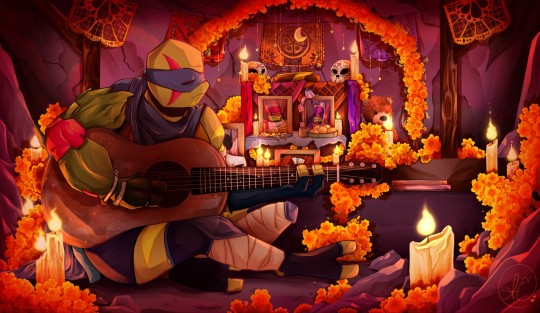
Día de Muertos
So it's been a minute ha...ha... Ah. This was supposed to be finished on día de muertos and then I got sick for a while and just got better. :'] but I hope you like it! I make a día de muertos piece every year for whatever fandom I'm in and this year it happens to be ROTTMNT so I wanted something... Warm and comforting.
(Edit: Changed to Día de Muertos since that is the correct wording hehe :> Someone thankfully caught it which is much appreciated. My dum dum self didn't ;v;)
#rottmnt fanart#rise of the teenage mutant ninja turtles#rise of the turtles#rottmnt#save rise of the teenage mutant ninja turtles#rise of the tmnt#rise leo#dia de los muertos#future leo#Im slowly working on the next Aon Arc but work is killing me sobs#but i hope you all like this regardless#this holiday means a lot to me so I try to put my all into it hehe#dia de muertos
1K notes
·
View notes
Text
The Brides immediate objective after everyone got separated: 

#when she acts like she doesn’t care but she does ™#actually love them sm#fishbride#the bride#nina mazursky#creature commandos spoilers#creature commandos#regardless of how you perceive their dynamic I absolutely love how they are bonding#I hope no one has done this yet
191 notes
·
View notes
Text
(GTN Spoilers) a locked tomb animation/amv i've been working on for uhhh.. you know what just roll it
#the locked tomb#gideon the ninth#griddlehark#gtn spoilers#gideon nav#harrowhark nonagesimus#camilla hect#ianthe tridentarius#cytherea the first#tlt fanart#you know i may have a bachelors of animation but i majored in art direction i hadnt animated in over a year before starting this#i kept the frames to a minimum to spare my already dire timeline#this genuinely was to keep myself busy and get some nice backgrounds for my portfolio#regardless i hope yall enjoy#artists on tumblr#cora-illus#animation#still tagging it as such tho. some of these shots have like. four frames in them#that counts for something#tlt#gtn
424 notes
·
View notes
Text
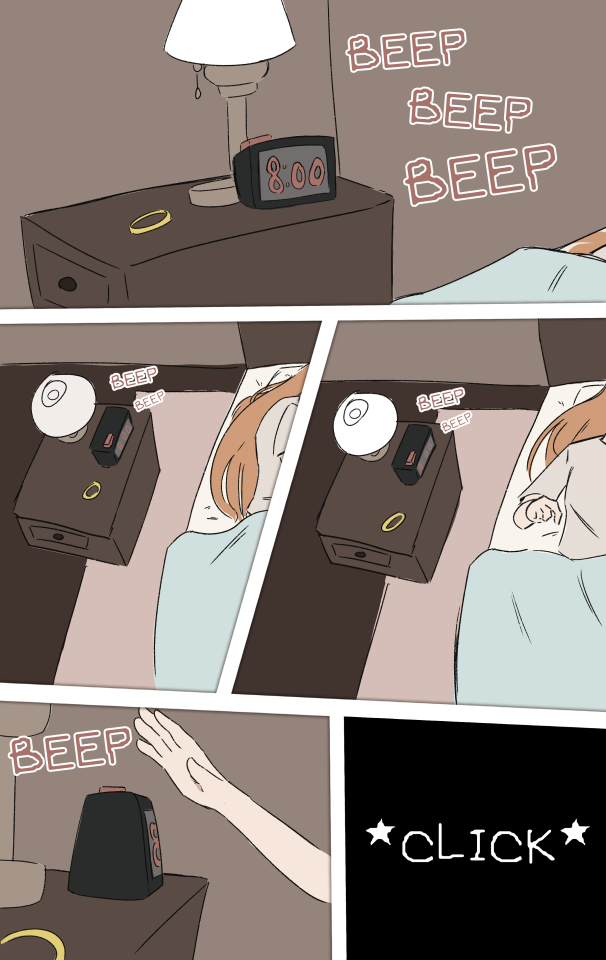
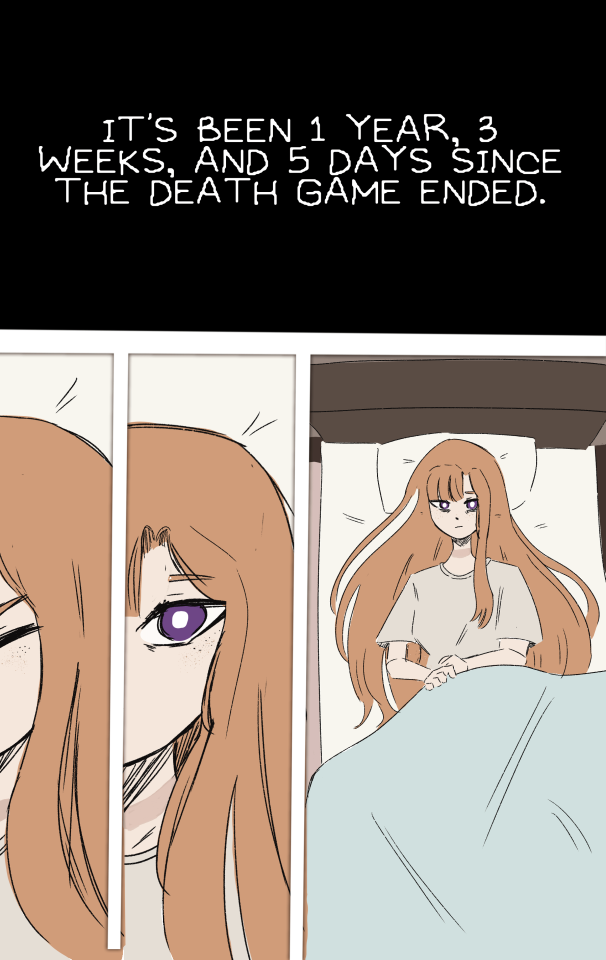
Moving Forward. (Spoilers for YTTD up through 3-1b)
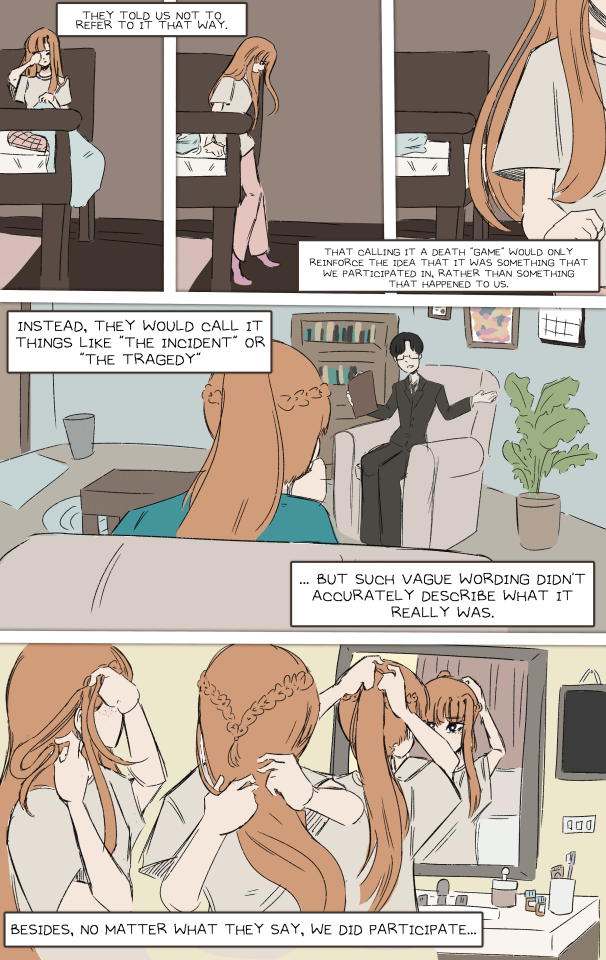
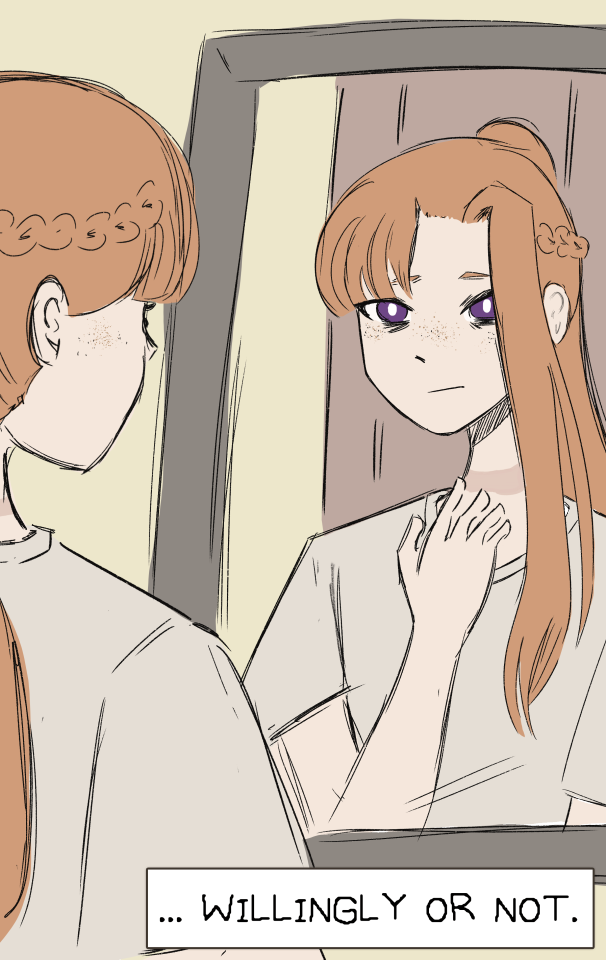
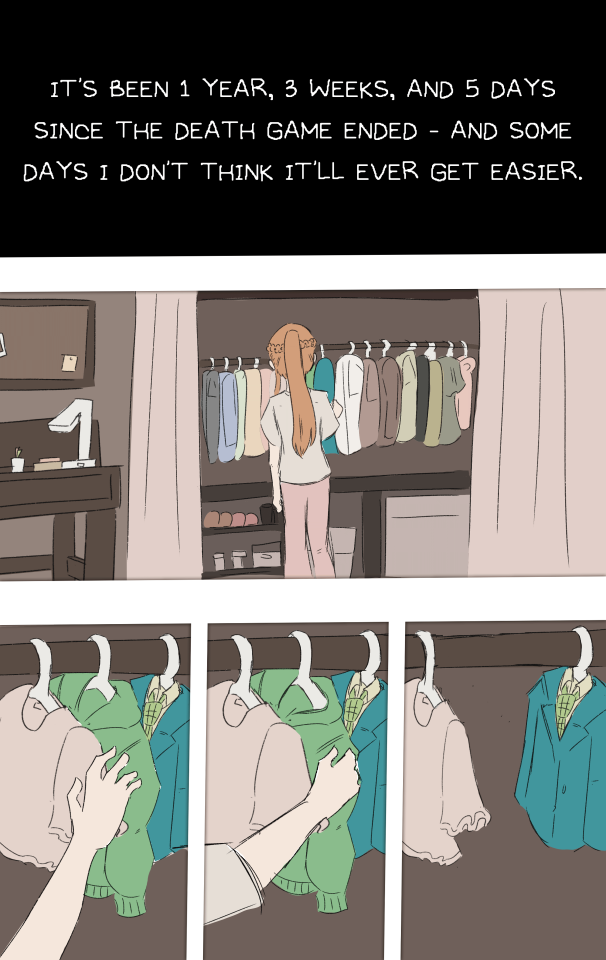
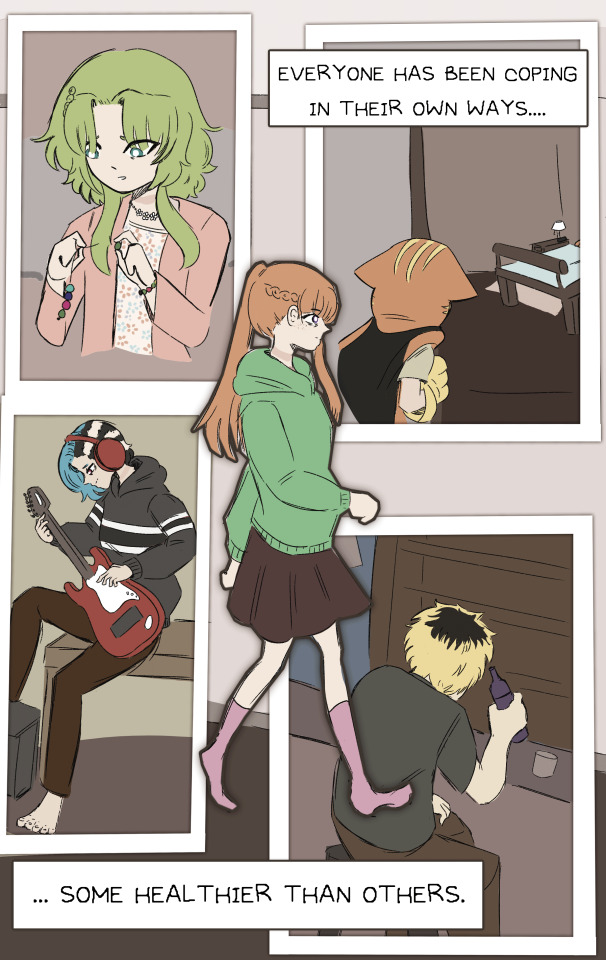
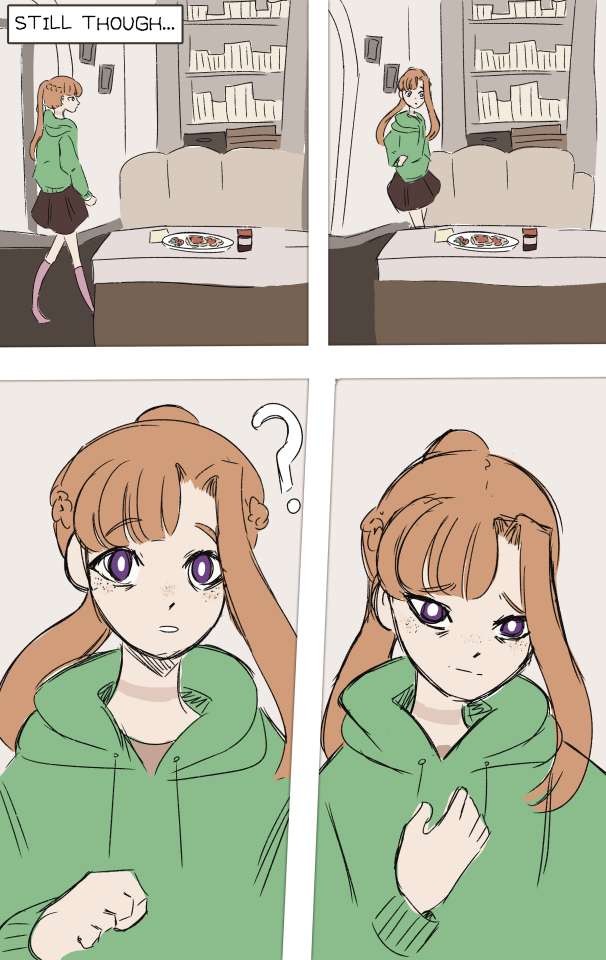
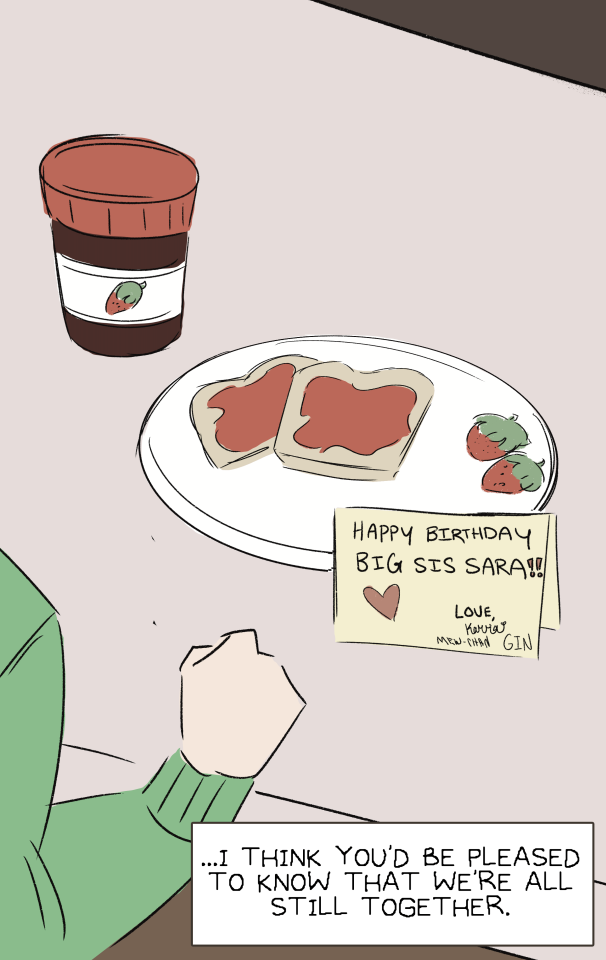
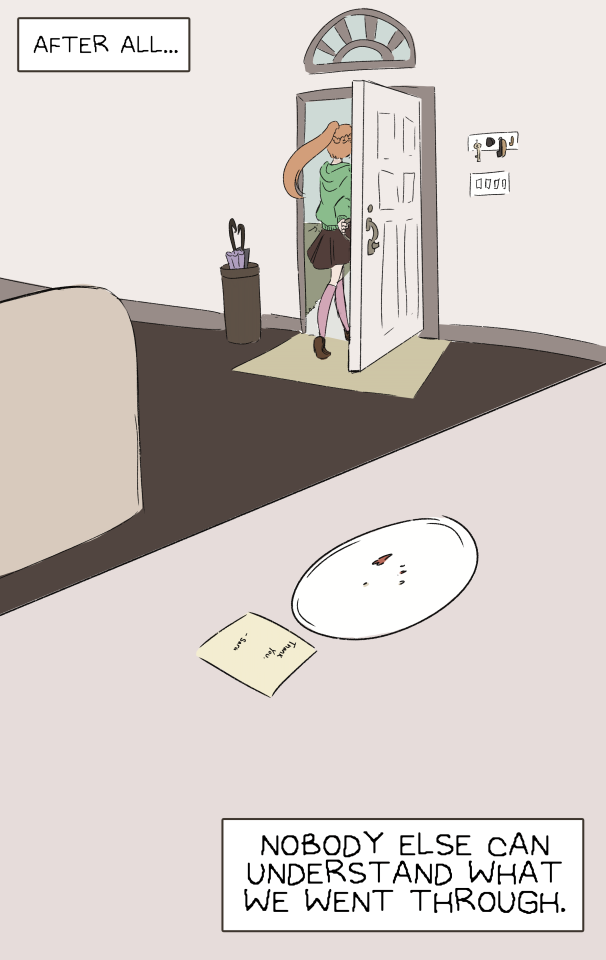
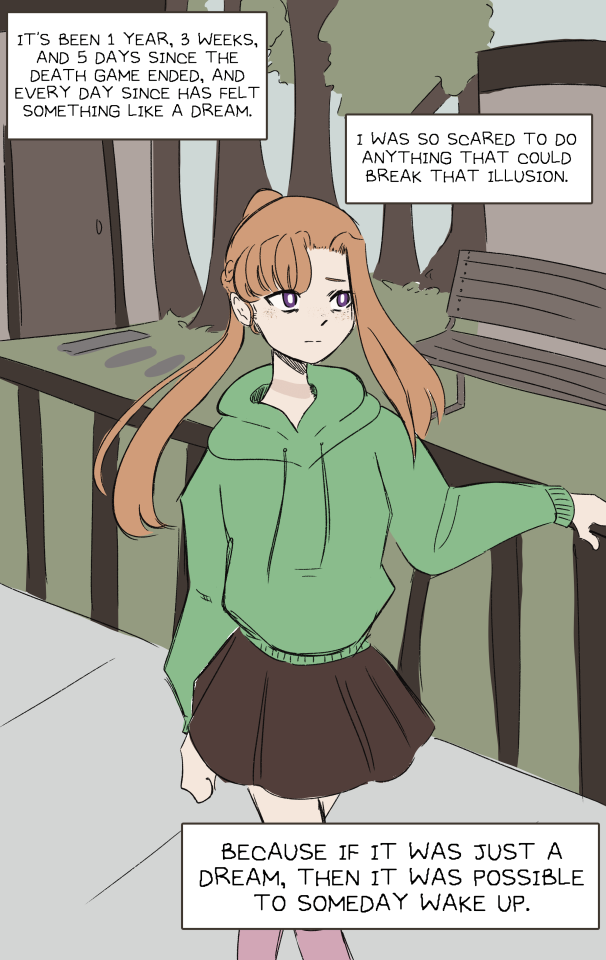
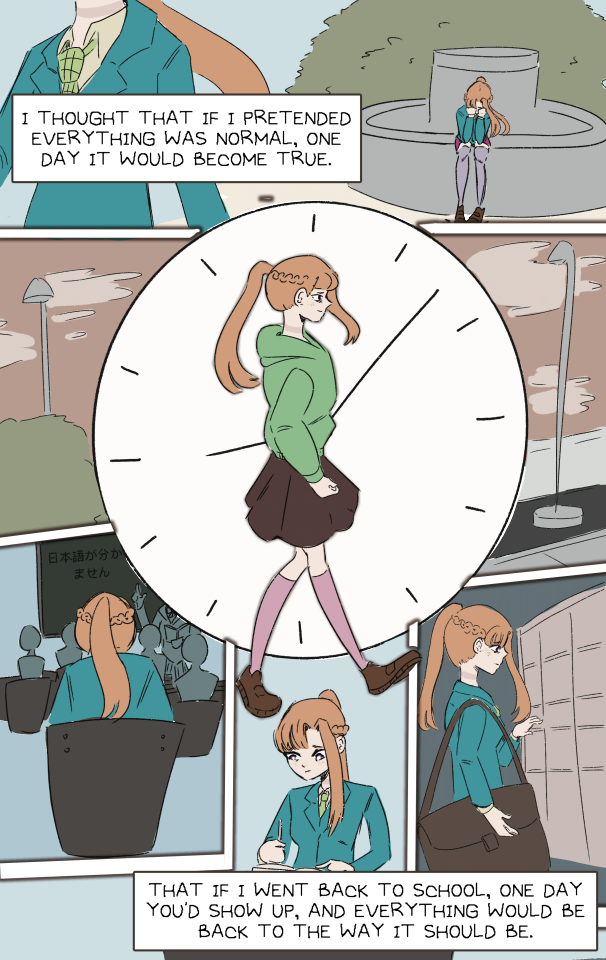
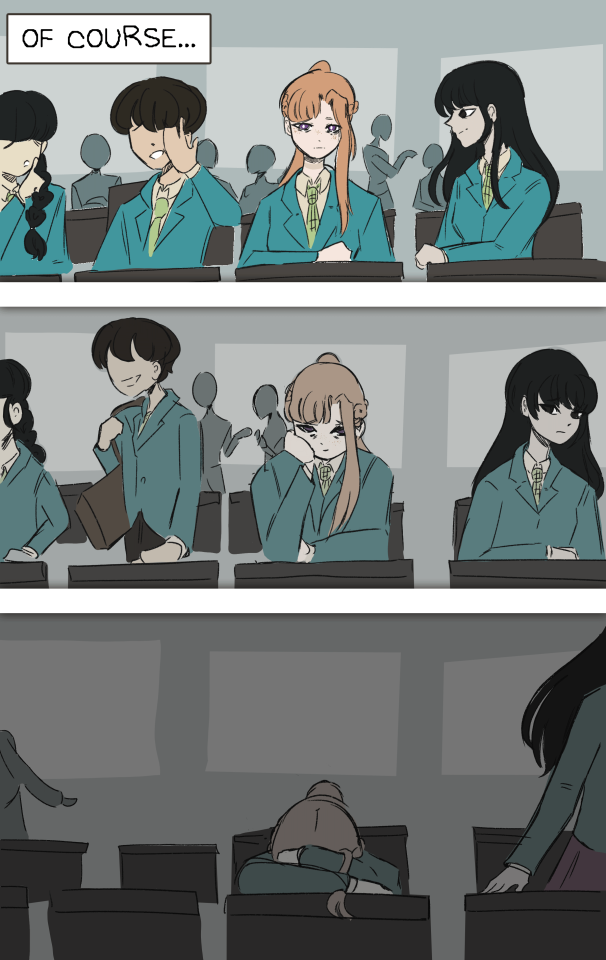
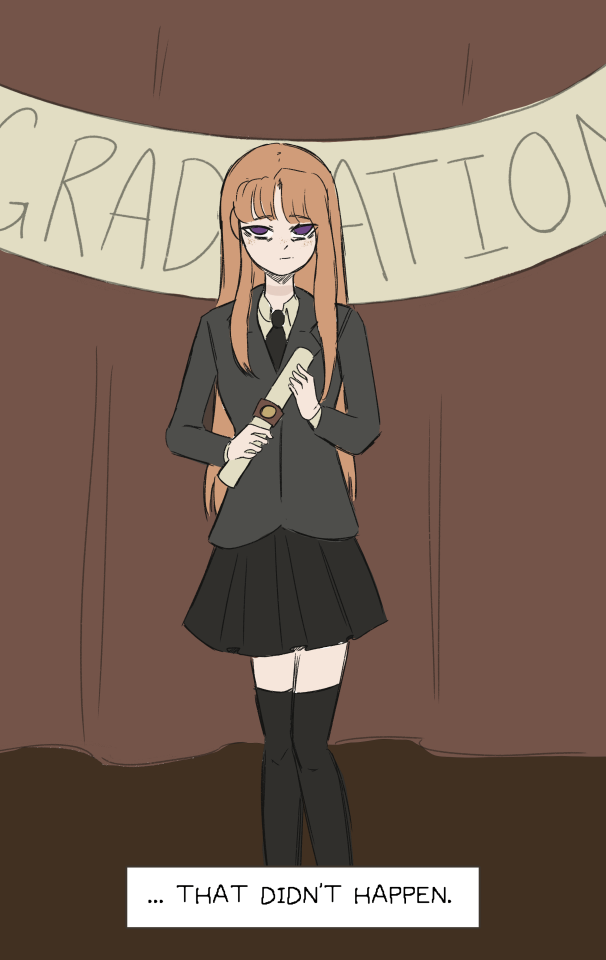
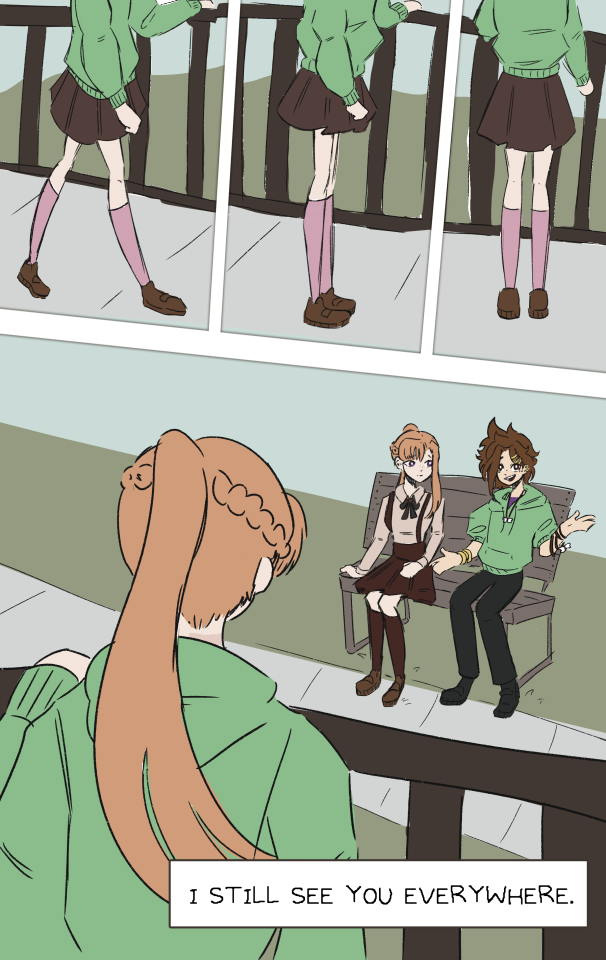
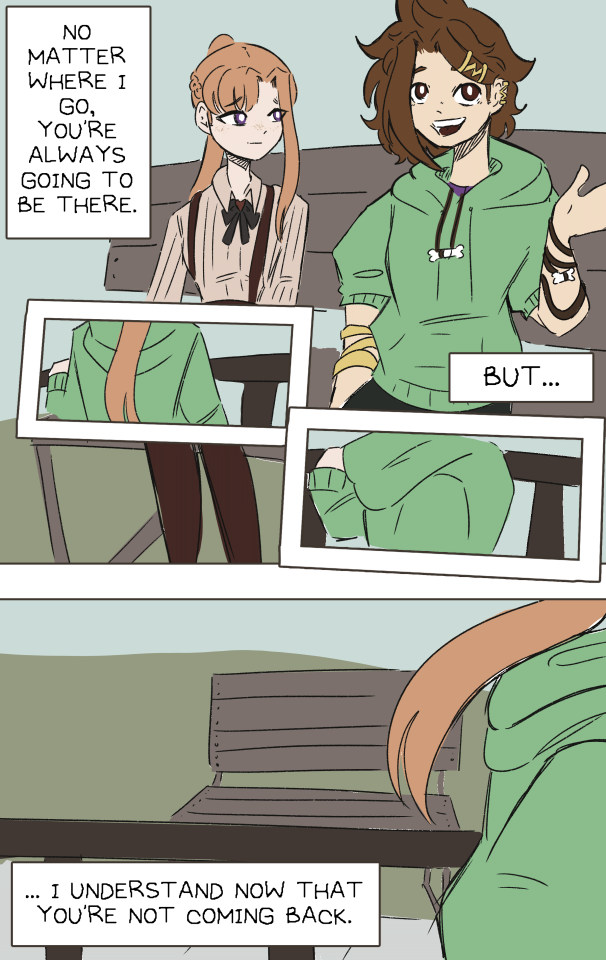
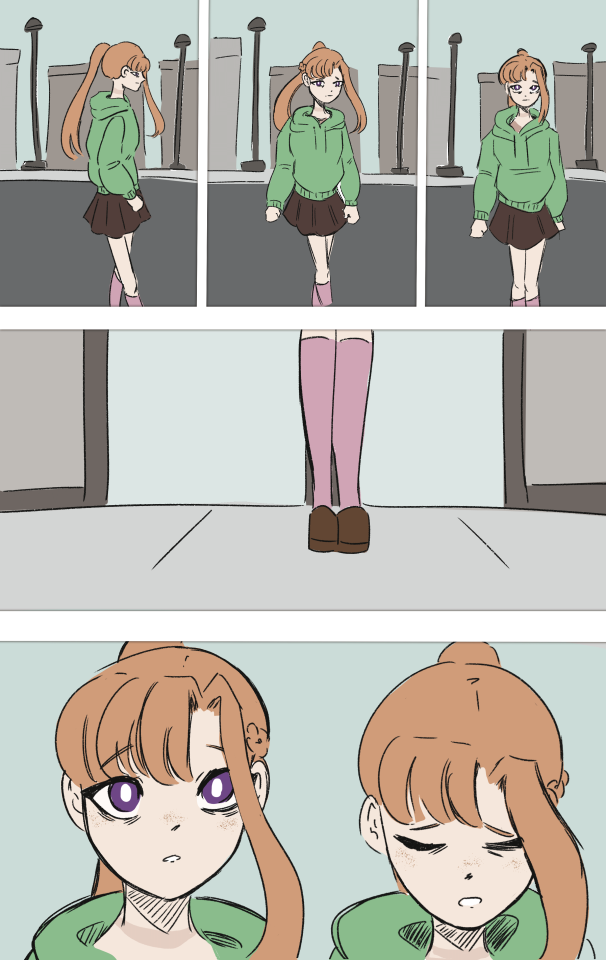
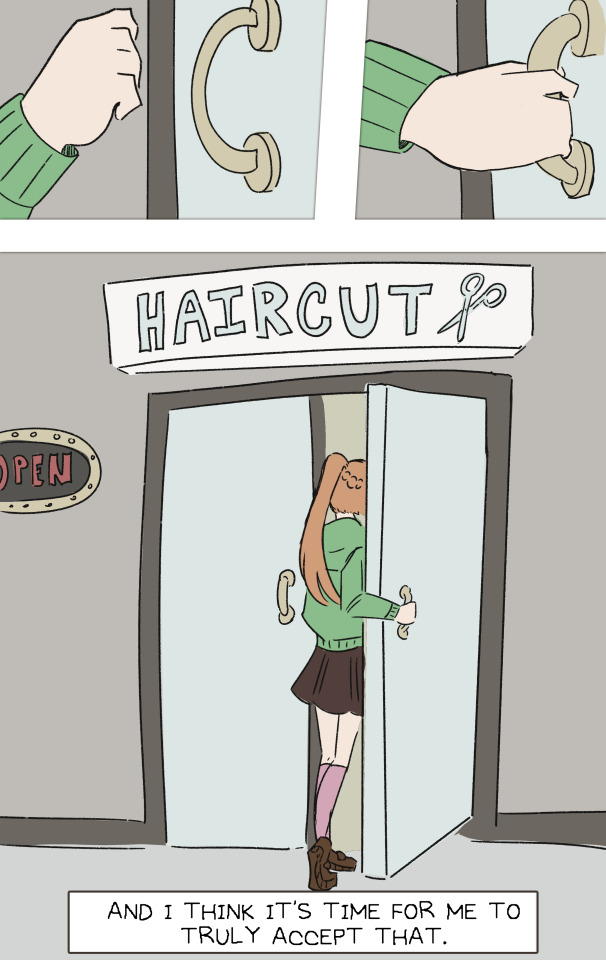
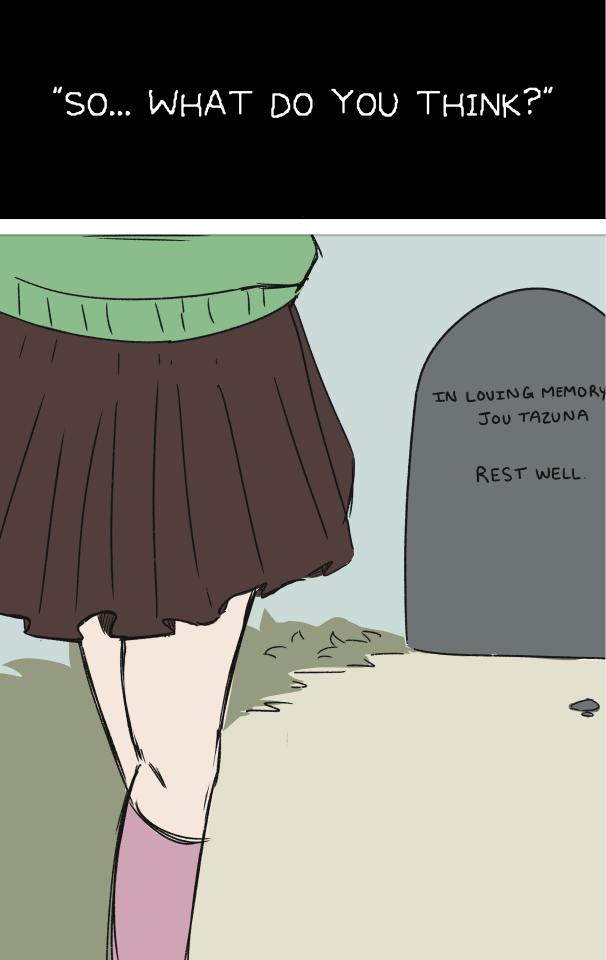
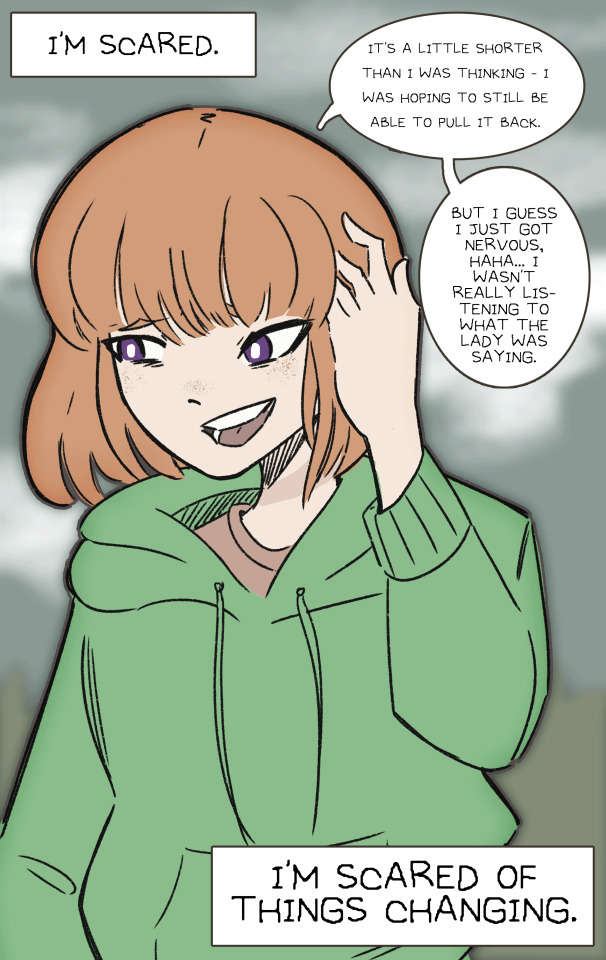
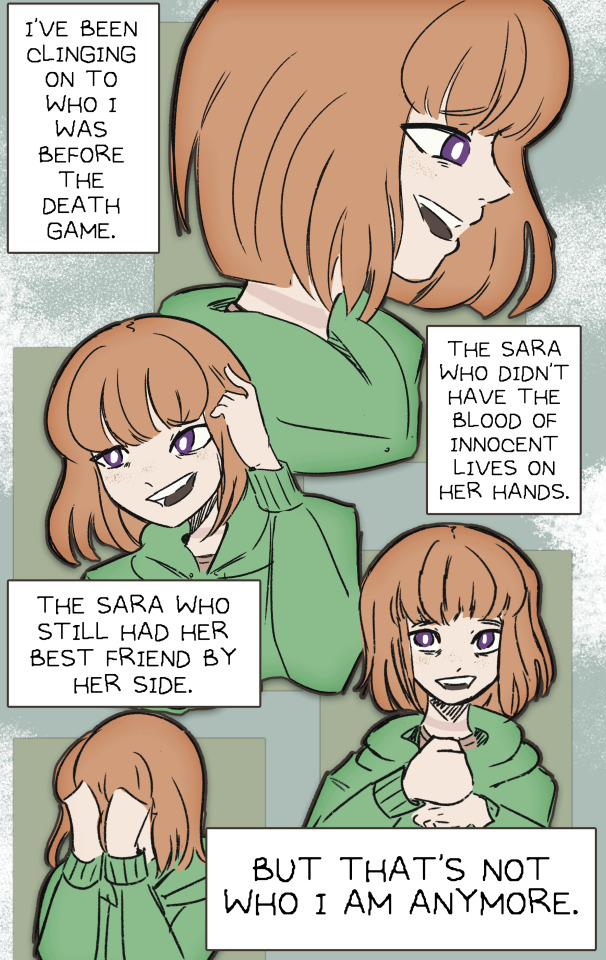
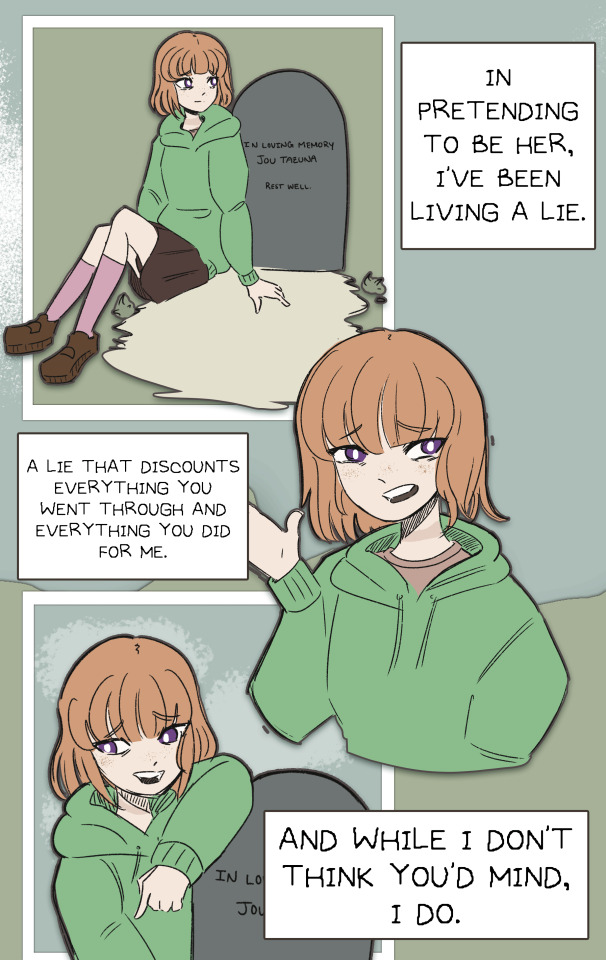
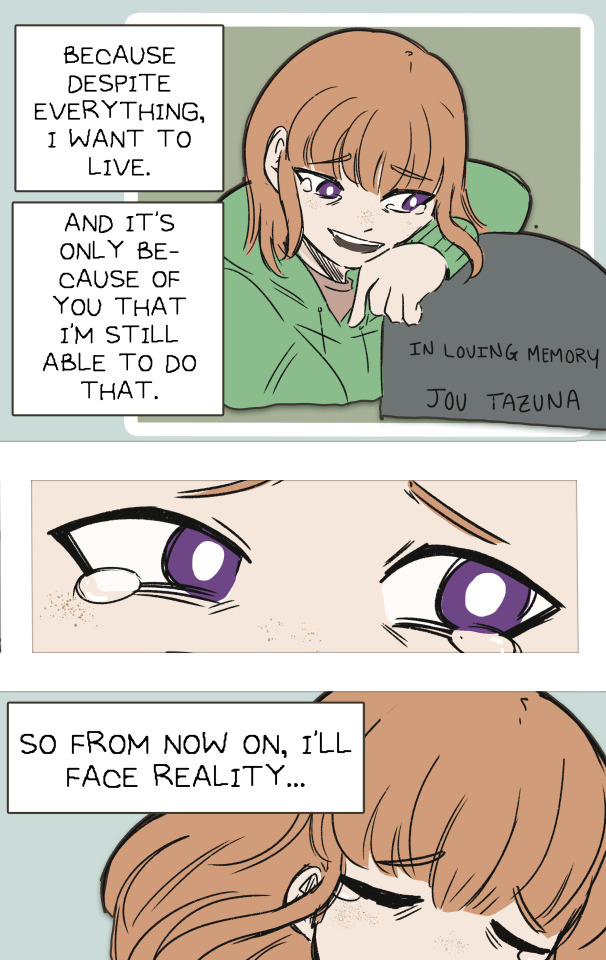
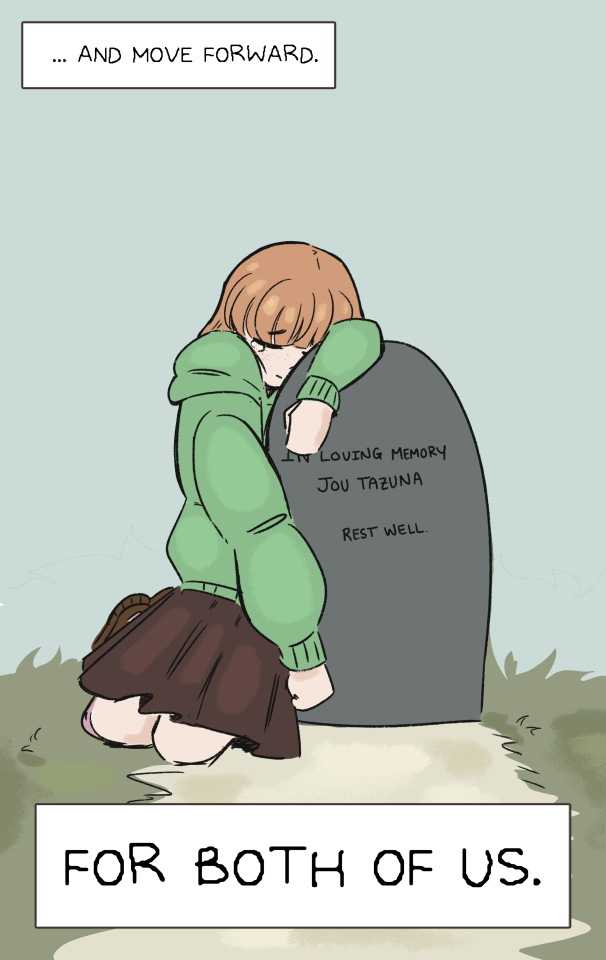
#your turn to die#yttd#yttd fanart#sara chidouin#joe tazuna#happy birthday sara#post-death game au#set in the Kanna/Alice lives route because that's personally my favorite#there are so many little hcs in this#sara will forever have freckles in my art#alice dyed his hair to match reko#also he's trying to get back into music for her#whether that's healthy or unhealthy is yet to be determined#Keiji is not doing so hot#angst#your turn to die fanart#ryoko isn't being mean i promise she just doesn't know how to help#yes sara is wearing joe's jacket#joesara >>>#I'm like 20 minutes late but I hope you enjoy regardless#god this took so long#I ran out of time to shade it I'm sorry </33#I hope you enjoy anyways!!#or don't#sorry for the angst on your birthday sara you deserve so much better
540 notes
·
View notes
Text
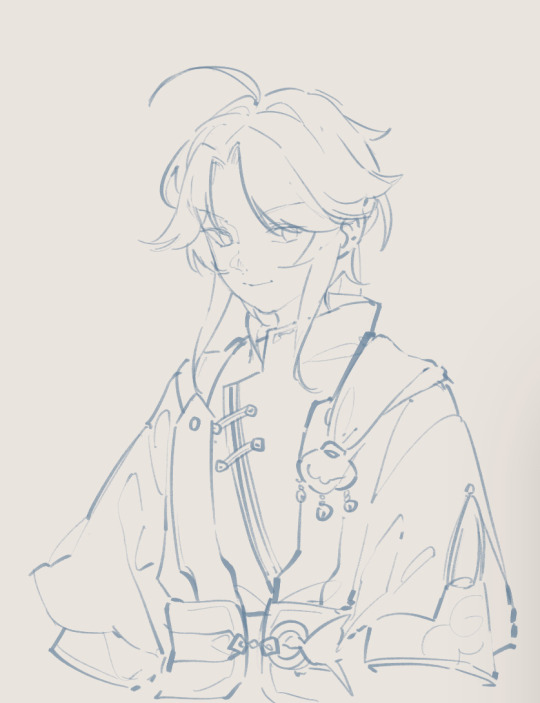
Haha
#yanqing#honkai star rail#hsr yanqing#my immediate fixation on ice wielding child genius characters in every media I consume strikes again#idk I just think he’s neat!! and so is his gender#he’s definitely overdesigned but I do enjoy the general shape of his clothes#like wow… baggy outer layer AND baggy inner layer#how come you get to have two baggy layers#still don’t know that much about him even after reading his character stories on the wiki#so I’m hoping that his quest writes him well#I suppose there’s some degree of like interesting contrast in the fact that he’s very young on a ship full of people who live very long live#but I feel like regardless they really don’t give him much of a personality besides his hyperfixation on swords and the general naivety and#inexperience from youth yknow what I mean#I just think it would be cool to see like why he’s so ambitious! was he railroaded into being a knight because of his talents? did he try#to be accepted as a knight? what kinds of expectations is he facing and what expectations does he place on himself as a result#I really hope he isn’t just there to be a simpler minded child character for jingyuan to take care of
2K notes
·
View notes
Text
Okay so this is almost a direct copy-paste of my earlier reblog but only the Xin Yuan parts, because its long enough to be its own post and i want to share it! It deserves it's own post <3 typical starry stuff to write a 2k word long reblog, unfortunately.
I say almost because I went through to proof read and ended up adding more stuff.
I've been cooking on this idea for the last two days since I saw the Xin Mo!Shen Yuan post but??? I can't find anything on Xin Mo's backstory or how it came to be -- which means that's free fucking plot right there baby. That's a sandbox and im making LIFE SIZED CASTLES. I'm so excited.
The idea of Shen Yuan transmigrating centuries before the events of PIDW as Xin Mo -- but when he wakes up, he's not the sword. He wakes up in the body of a young boy named Xin Yuan. Now it makes sense for this boy to be a demon, but the drama, the intrigue, the spice of Xin Yuan being a human child.
SY wakes up as a boy below the age of ten, and the System tells him where he is, and SY is excited to meet his favorite protagonist -- only to gradually realize that he's like, a thousand years or so before the events of the novel. The rant he gives the system is legendary.
Bc what's the point of getting dropped into PIDW if he's never going to meet his favorite character??? This is a scam! BUT he settles into his new life, he's like, some orphan street rat or some other tragic airplane-esq backstory.
The system gives Shen Yuan his first mandatory quest: become a righteous cultivator. Which was like, kinda his plan/hopes anyways, except! There's like?? No official cultivator sects anywhere? The Cang Qiong Mountain Sect hasn't even been established yet, and there are pockets of cultivators running around, maybe some groups or schools popping up and then sinking back down, but nothing's really taken root!
If he asks someone how to become a cultivator, there's no straight answer. No "oh you can go to X to do that". He's pissed! How can he become a cultivator if there aren't any schools around to teach him? Deus ex machina, that's how.
Out of sheer luck, SY manages to help save a rogue cultivator, and promptly gets adopted by said rogue cultivator, who gives SY the name 'Xin Yuan'. He is ecstatic. And you know what? It's actually pretty fun!
He's getting to travel the world of PIDW in its early stages, and gets to see the building blocks for the eventual main story. He's discovering all this local flora and fauna that are foreign to his old world and unmentioned in the book, and he's learning cultivation! Granted, its unsafe, newly(ish) discovered cultivation, but it counts!
Wistfully, he thinks about perhaps he'll do something grand and get his name carved into legend. Something that would eventually help the protagonist later down the line in his quest for revenge.
The system remains silent to his thoughts.
But Xin Yuan doesn't take much stock in that daydream anyways. It's nothing more than fantasy to him; wish-fulfillment. He does discover however, that he is positively brimming with spiritual energy. Overwhelmingly so.
It's both a blessing and a curse, as it puts a strain on his meridians if he's not careful, and leaves him prone to qi deviations for the exact same reasons. He already has a heart demon or two from a few traumatic experiences in the past.
(bc hey! angst a day keeps the writer sadism at bay, and all that)
I'll say he's about... eight when he gets picked up by the rogue cultivator, who I'm calling Lin Kai bc he deserves a name. They travel around PIDW up until Xin Yuan is twelve, where he goes through a traumatic experience that results in a heart demon.
It's after that that Lin Kai decides to put a stop to his wandering, and find a place to settle down to raise Xin Yuan in. Coincidentally! They settle down in a nice mountain region that's thriving with spiritual energy. The mountains at the time were called something different, but they will be eventually known as the Cang Qiong Mountain Sect
Coincidentally, the mountain Lin Kai and Xin Yuan end up on is Qing Jing Peak. XY does not realize that the mountain he's on is Qing Jing. The System does not tell him. But he likes it there, more than he was expecting. And as much as he's traveled around, he really does enjoy being in one place.
He has a tendency to go down the mountain and help the village setting up down there, and when he's a teenager he starts venturing out more and more.
Xin Yuan forgets sometimes that he's in a novel, especially after settling down on Qing Jing peak. The system becomes remarkably quiet since there's no quests for him to do and not a ton of opportunities to get B-Points. He cultivates with Lin Kai, helps tend to the garden they're growing, goes down to the village to play with the other kids.
There's one boy he's best friends with, a boy whose not all that good with words, named Liu Zhihao. He's got potential for cultivation though, so Xin Yuan drags him up the mountain when he can so that Liu Zhihao can sit in on lessons with Lin Kai. He drags him all over the forest at the foot of the mountain to go look at bugs and animals.
(One time, when they're fourteen and Liu Zhihao has been learning cultivation for a few years now, Xin Yuan drags him out of bed late one night to go look at the stars. Xin Yuan tells Liu Zhihao about ascension -- something that still feels like a far off dream to many in this time -- that night, while they're sitting on the wet grass.)
("We should ascend together." Xin Yuan tells Liu Zhihao, jade eyes gleaming. Never let it be said that Xin Yuan doesn't love deeply, no matter what kind of love it is. He was always so lonely as Shen Yuan, Liu Zhihao is his best friend. "We'll become immortals, and then we won't ascend until the other is able to.")
(Liu Zhihao stares at him silently, his face unreadable. Then, quietly, he asks; "Promise?")
("Promise.")
When he starts adventuring outwards, further away from the mountain and the village, Liu Zhihao sticks to him like rice. Not that Xin Yuan's complaining, that's his best friend after all, and Liu Zhihao has become a formidable cultivator. He deserves to show off his skills.
He starts making something of a name for himself by the time he's, like, 18 -- although that name is in its baby steps, along with Liu Zhihao. They're slowly growing renown.
Perhaps XY uses his knowledge of PIDW and cultivation in general to help make advancements in the cultivation field. Although the system prevents him from sharing too much, it doesn't mean he can't practice it himself. Perhaps he's one of the first cultivators to develop a golden core. One of the first known immortal cultivators. One of the first to have a spirit sword.
(Although I don't know the logistics of any of this since my knowledge on xanxia/cultivation stuff in general is all still pretty new and google wasn't all that helpful lol.)
Either way, its my excuse to eventually make Xin Yuan come across as ethereal to other people. Peerless beauty SY for the win. Hs wifebeam is too strong, Xin Yuan has a line of suitors following after him and he's completely unaware of it. The rest of history is not.
Demon realm stuff has been stirring up since Xin Yuan was a kid, but at the time it was rare and in the beginning stages. Its been steadily ramping up and the system is sending him on more and more treacherous quests -- some of them mandatory, some optional. SY doesn't often take the optional ones unless it comes with a sufficient B-point reward.
for all intents and purposes though, he's a wandering rogue cultivator with Liu Zhihao, going from place to place to either help a town or village, or to discover more creatures or artifacts (although there aren't that many). Just all around living his life. He participates in a few major quest lines that are sure to get him mentioned in legend, even if it's a background character way.
(Unbeknownst to him, rather than being a side character in these legends, he's named directly. You can't become one of the first immortal cultivators and NOT get name dropped for clout.)
He has a spirit sword named Shā Mó, (杀 shā - to kill/weaken/counteract/reduce) (魔 mó - evil spirit, demon, possession). He routinely goes back to QJP to see Lin Kai, or to rest when traveling has worn down on him and he wants nothing more than to sleep somewhere he knows he'll be safe in. It becomes more frequent as Xin Yuan becomes more famous. Liu Zhihao often comes with him.
it all comes to a head though when the rifts between the demonic realm and the human realm become too great, and the balance between both realms becomes unstable. A demonic emperor's influence, wanting to merge the two realms so he could conquer both to satiate his own greed.
Typical evil king stuff. This comes to a climatic head in a great battle between every cultivator available and the demon emperor's army. Xin Yuan was one of the many who helped lead the charge.
In the end, it was Xin Yuan who ends up defeating the demonic emperor, but the rift that the emperor used to cross between worlds is destabilizing as well. Except instead of trying to close, it's getting bigger and bigger, threatening to swallow the heavens and earth and demonic realm whole.
You know how Yue Qingyuan's soul is bonded to his sword due to a qi deviation? Let's take it a step further >:)
Xin Yuan uses himself and Shā Mó to close the rift. However, it takes all of his spiritual energy to do so, as well as him filtering the demonic qi into his body to redirect it back to the demon realm.
In the end, Xin Yuan and his beloved sword Shā Mó fuse. Xin Yuan's soul becomes trapped in the sword. His physical body is unable to handle the immense amount of power it takes to close the rift, and is destroyed. He is immortalized in legend by his grieving cultivators.
(Liu Zhihao ends up ascending alone. He ascends with the hope that one day he'll see Xin Yuan again, even if it's in the face of someone else. Lin Kai does not ascend, too weighed down by the grief of losing his son.)
Xin Yuan, now Xin Mo, falls into a stasis. He's very confused and disorientated when he regains 'consciousness'. The system has been silent for most of his life, only popping up to give him mandatory quests, hints, points, or to answer any questions.
But once he wakes up, it cheerfully pops up again, congratulating him on completing the origin story of Xin Mo. SY freaks the fuck out. he'd shake the system screen if he could, but he doesn't have arms. or legs. or eyes for that matter.
He can sense his surroundings, but its all like imprints to him. He can sense the energies, but he can't see anything. It's all very disorientating and horrifying after years of being human. Like a sensory deprivation chamber.
The closing of the rift and the cycling demonic qi tainted both Sha Mo and Xin Yuan irreparably, and it did some kind of damage that resulted in SY needing to feed in order to use the spiritual powers. Kinda like how Xuan Su uses YQY's life force for it's spiritual energy, but instead of feeding on his own lifeforce, Xin Mo feeds on others.
The rest is history. Xin Mo is originally tied to the story of Xin Yuan -- believed to be all that remained of the man after he sacrificed himself to keep the realms separate. It's believed that the force of the realms closing permanently infused Sha Mo with demonic energy, turning it into Xin Mo.
But, like many stories do when faced against the tide of time, things get lost; chipped off; changed. Xin Mo is steadily separated from Xin Yuan, especially once it becomes clear how parasitic the sword really is, until they are all but separate entities themselves and the origin of Xin Mo's creation all but forgotten.
The years blur together when Xin Mo is not being wielded, and at first Xin Yuan was agonized by the fact that he stole the lives of all his wielders. He knows it's only a novel, but his decades spent in this life have softened him, and he's grown attached to the world around him.
But time erodes the mind like water erodes stone, and he becomes numb to it, then eventually anticipating of it. He forces himself to remember what he knows of PIDW's plot, and kinda fixates back on his old obsession on Luo Binghe. But while PIDW stays in his mind, his memories as Xin Yuan fall to the wayside.
Not forgotten, per se, but... tucked away. The system prevents him from forgetting fully.
Xin Mo isn't fully a demonic sword either i think, but instead harbors an ugly cocktail of both spiritual and demonic qi. Special circumstances and all that. Everyone just assumes he's a fully demonic sword because that's usually at the forefront, his spiritual qi weakened from the initial fusion and from years of not being fed spiritual qi. It's part of the reason his wielders always end up destroyed by him, other than the whole, yk, 'overwhelming qi' thing.
Nobody would recognize Xin Mo's human form as Xin Yuan other than some truly ancient demons. Of which Meng Mo might. But even that's iffy because there's a lack of surviving paintings of Xin Yuan, but also because of XM's demonic appearance and supposed lack of connection to XY.
Xin Mo has never spoken to his wielders before, not in the same way he does Luo Binghe. He tells Luo Binghe this, and he also tells Luo Binghe down the line that he is both spiritual and demonic -- something he also never told his wielders because there was no point to it.
okay okay i've got to end it here because its already gotten ridiculously long -- of which im both apologetic and unapologetic for -- but i DO think the Shang Qinghua and Shen Yuan meeting (and reveal) would be fucking hilarious. Especially if SY has learned how to pop between sword form and human form by then -- although i guess it doesnt matter either way because SQH's reaction is still the same.
And that reaction is internally screaming and going "hey what the FUCK?? WHY DOES XIN MO HAVE A HUMAN FORM??? WHAT IS THIS??? SYSTEM??? EXPLAIN???"
meanwhile from his place on the sword hilt xin mo is squinting at Shang Qinghua in bewilderment and going "aren't you supposed to be dead" but doesn't pay too much mind to it because its not like its going to change anything.
...up until he catches shang qinghua going "WTF" silently from his little corner while all eyes are off him. One moment SQH is standing beside his king, and the next he's been tackled to the ground by one wild-eyed, human-shaped Xin Mo.
everyone, including SQH, thinks Xin Mo is going to kill him. It is a surprise to everyone when he does not, and instead dissolves into deranged, uncontrollable laughter after spitting out some phrase in some ancient tongue and watching SQH's eyes grow wide in recognition.
#svsss au#svsss#scum villain au#scum villain#scum villain self saving system#shen yuan#shen qingqiu#luo binghe#liu zhihao is indeed based off liu qingge. i am a multishipper at heart and liushen is a delicious ship. XY and LZ i think were very devote#to each other regardless of if it was romantic or platonic. they're besties! and im a sucker for devotion in all aspects. its neat :)#XM eventually tells LBH about how he used to be human once and he tells him about his Xiao Zhi. and that he hopes Xiao Zhi was able to reac#ascension in his absence. LBH silently seethes with jealousy and abandonment issues a mile wide. he asks XM if he misses him. XM gets this#unreadable distant look on his face that makes him look far more mortal than is comfortable. then he mutters 'yes.' LBH hates it#Cang Qiong sect gets miraculously spared by Luo Binghe on account of 'my demonic sword grew up here and he'd be upset if i ruined it'#does LZH look like LQG? ...i want to say yes bc itd be crime to derive SY of LQG's beauty even if he never knows what LQG looks like#imagine XM as human coming to clash with YQY. he takes one look at YQY. then at Xuan Su. before going 'we're alike. you and i.'#rip SQH. executed for the crime of *checks scroll* making XM laugh before Binghe could. making XM laugh at all actually#XM is usually very reserved and restrained but for the first time in a thousand years he's met someone just like him. the emotional rush#is intense. SQH asks him later how long he's been Xin Mo. expecting like. at LEAST a few years now or after him but then XM blinks at him#and then mutters something about how he's lost track of time. oh hey btw what year it is??? he forgot to ask. SQH tells him and Xin Mo says#'oh! about a thousand years now' 'WHAT' and XM tells him about being Xin Yuan which SQH was not expecting. whether thats because#he genuinely wasnt expecting it or it was part of his outline or an idea he messed around with and didnt expect to make it into the world#SQH tells him about the legend of Xin Yuan. XM is stunned. he asks about Liu Zhihao. LZH made it into legend too. which XM is very#pleased by. 'good. he deserves it for all the hard work he put in.'
185 notes
·
View notes
Text

#trying smthn new!#I’ve been dying to put the coven on alignment charts#so I finally learned how to make memes like this mwahahaha#also if ur not a fan of this dw I’ll likely still be doing incorrect quotes most of the time#also yes Sharon Davis would be on the ‘only one who cares abt the religious meanings’#I just forgot to add her whoops 🫣#also merry xmas eve#hope you have an excellent day regardless of if you celebrate or not <3#agatha all along#incorrect agatha all along#agatha harkness#rio vidal#billy maximoff#teen (agatha all along)#billy kaplan#jennifer kale#alice wu gulliver#lilia calderu#the coven of chaos#not an incorrect quote
130 notes
·
View notes
Text


















jungkook x favourite eras: @jkvjimin edition
#btsedit#btsgif#jungkookedit#dailybts#usersky#userpat#userines#heygingko#userdimple#usersevn#raplineuser#uservans#annietrack#useremmeline#rjshope#usermaggie#usermizuoka#jungkook#*mine#tw flashing#been awhile since i did a comp like this#this one was tricky especially the mots 7 section because we love uneven colour schemes among outfits#i digress at least the colouring process wasn't too difficult#hi pat you knew this one was coming but i hope you love it regardless 💗
362 notes
·
View notes
Text
One thing that I feel is really interesting and often forgotten about Essek is that fundamentally, his characterization has been from the start based upon his desperation for external perspectives and connection, which, along with much of his narrative and mechanical positioning, means that he actually has an extraordinary and almost (but not actually, as I'll show) counterintuitive capacity for both growth and trust.
(Buckle in. This is a long one.)
In particular, I would argue, knowing now that many places where the plot touches Ludinus have long been marked for connecting back into the current plot, that he was quite possibly built as a prime candidate for radicalization by the Ruby Vanguard. He felt isolated from his culture, he was desperate for other connection, and he was certainly of the type to believe he was too smart to be drawn into such a thing, given his initial belief that he could control the situation and the fallout. If things had gone any other way, he easily could've been on the other side by now.
As such, he has been hallmarked by being fairly open to suggestion, perhaps for this reason, but the thing about that kind of trait is that it is both how people are radicalized and deradicalized. This is certainly true of Essek, who experienced genuine kindness and quite frankly strangeness from the Nein and was able to move from the isolation the Assembly had engendered to meaningful and genuine connection, largely propelled by his own internal reflection. By the time Nein are aware of his crimes, he's already begun to express regret to an extent and, furthermore, doubt in the Assembly, including explicitly drawing a line against Ludinus, even in a position where he was on his own and probably quite vulnerable.
Similarly, when the Nein reach the Vurmas Outpost some weeks later, he has moved from regret for the position he's ended up carrying a heavy remorse. This makes sense! He's fairly introspective, seems used to spending a lot of time in his own head, and was left with plenty to mull over. It's not some kind of retcon for him to have progressed well past where the Nein left him; it just means he's an active participant in the world who has done his own work in the meantime.
This is another interesting aspect to him. I've talked about this a bit before but I cannot find the post so I'll recap here: antagonists in D&D have significantly more agency than allied NPCs. Antagonists are active forces, against which the party is meant to struggle; allies are meant to support the PCs, which means they tend to be more passive in both their actions and their character growth. Essek was both built as an antagonist, in a position that gives him significant agency, and also was then given significant opportunity to grow specifically to act as a narrative mirror for Caleb's arc. Even when he becomes a more traditional D&D ally, he still retains much of that, though he occupies a supporting role.
I believe that this is especially true because of the nature of Caleb's arc, which I've already written on; the tl;dr of this post is that Caleb is both convinced that he is permanently ruined and also desperate to prove that change is possible. Essek is that proof, because he is simply the character in a position to do so. But this also means that his propensity for introspection and openness is accentuated! He has to do the legwork on his own, for the most part, because that's where he is in the meantime.
But he still ends the campaign necessarily constricted; he is under significant scrutiny, he's at risk from the Assembly, and he goes on the run fairly soon after the story ends. He spends most of the final arc anxious and paranoid, which is valid given the crushing reality of his situation. It would be very easy to extrapolate that seven years into this reality, he would be insular, closed off, and suspicious of strangers, even in spite of the lessons he's learned from the Nein and their long term exposure.
So seeing his openness and lightness now is surprising, but at the same time, given this combination of factors in his position in the narrative over time and his defining traits, it's not by any means unreasonable.
But one thing that I found so delightful is how much trust he exhibits, which is obviously a wild thing to say about Essek in particular, given much of what he learns is both earning and offering trust, which was something he says explicitly in 2x124 that he's never really experienced: "I've never really been trusted and so I did not trust." It makes up much of the progression of his relationship with Caleb, and the trust that he is offered by the Nein in walking off the ship is the impetus he needs to grow.
But I think it's easy to talk about trust when it comes to people who have proven themselves to you or to whom you've ingratiated yourself, and that's really the most we can say about Essek by the time he leaves the Blooming Grove. There is this sense in a lot of discussion of trust (not solely in this fandom) that it is only related to either naivete or love, but there's far more to it. Trust at its best is deliberate—cultivating an openness to the world at large is a great way to combat cynicism and beget connection instead. It allows a person to maintain curiosity and be open to experience, but it can be incredibly difficult to hold onto.
It is clear that the Essek we meet now is a very pointedly and intentionally trusting individual. He trusts Caleb and by extension Caleb's trust in Keyleth, as he shows up and picks up a group of strangers from a foreign military encampment and walks in without issue. He trusts the Hells to follow his lead moving through Zadash and to exhibit enough discretion so as to avoid bringing suspicion upon all of them. He trusts that Astrid will respond well to his entrance, but he also trusts himself and the Hells enough to execute a back-up plan in the case that she doesn't. In the end, he even trusts them enough to give them his name and identity.
He doesn't scan as someone who has spent half a dozen years living like a prey animal, afraid of any shadow he runs across in an alley, withdrawn into himself and an insular family, which would've been an easy route for him to take. He scans as someone who has learned the kind of trust borne of learned confidence and a trained eye for good will and kindness, which are crucial weapons one would need for staving off cynicism in his circumstances—as if he has survived thanks more to connection and kindness than paranoia and isolation. (If we want to be saccharine about it, he scans quite poignantly as a member of the Mighty Nein.)
So it is easy to imagine this trust and openness as a natural progression of his initial search for perspectives external to his own cultural knowledge. Though he makes those first connections with the Assembly to try to vindicate his personal hypotheses, he finds in them exposure to the deepest corruption among Exandrian mortals, which could've—and did, for a time—turned him further down that same dark path.
But it's also this same openness to exposure from the wider world that allows the Nein to influence him for the better, and in spite of the challenges he's certainly faced simply surviving over the past seven years, he seems to have held onto this openness enough to move through the world with self-assurance and a willingness to extend the kinds of trust and good will that he has been shown.
(I would be remiss not to mention that I was reminded about my thoughts on this by this lovely post from sky-scribbles and their use in the tags of 'light' to describe Essek's demeanor this episode, which is really such an apt word for it.)
#something something hope is a weapon hope is a discipline hope is a garden to cultivate!!!#HE'S SO GOOD HE IS TRULY EXEMPLAR OF THE WHOLE PHILOSOPHY OF THE NEIN AND I DO NOT THINK THAT'S AN ACCIDENT#truly just like. enormous proponent of letting trust and curiosity into your heart regardless of the horrors.#it's hard and it makes you more vulnerable and sometimes it hurts so so much but it will also save your fucking life!#cr spoilers#critical role#essek thelyss#cr meta#I was gonna apologize for the length but I'm not sorry. I'm also not sorry for being insane about him but he's so special to me.#head in my hands he's so GOOD HE'S BEST BOI! GUIDING LIGHT NORTH STAR!!! LOOK AT HIM!!!#also truly if i had two nickels for a span of time with no essek sightings where I wrote a lot of fic#with deliberate personal acknowledgment that I was writing some pretty maximal arcs for him in terms of character growth#and then end up getting essek for half an episode and having to go OH WE'RE GOING THAT FAR ACTUALLY. FUCKING INCREDIBLE.#yanno. two nickels. but good lord I am thriving that it's happened twice#augh this is ONE of the pieces I need to write this week. we're not gonna talk about it
341 notes
·
View notes
Note
i wanna know more about svsss menopause
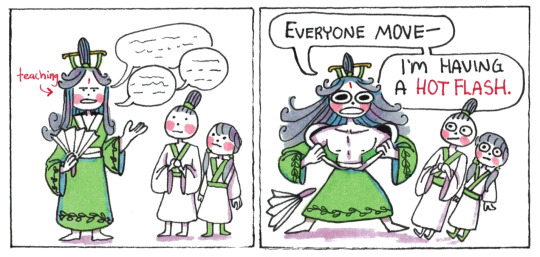
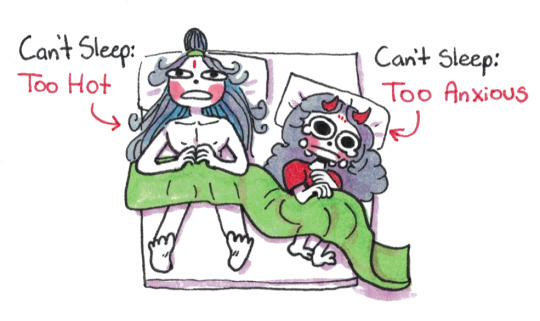

They synced their periods together too well. Now they are synced through their perimenopause years.
#Poorly drawn svsss#svsss#shen qingqiu#luo binghe#shang qinghua#mobei jun#ask#I truly think that the peak of the SVSSS (peri)menopause era is just them commiserating over the experience of it.#Not pictured here is Liu Qingge barely suppressing his hormonal rage. He would have it *bad*.#I think Liu Mingyan is the only person who does not have a bad time with menopause because she takes estrogen supplements.#Which sounds like a trans headcanon but I think regardless of cis/trans status she's researched this and is prepared.#I have developed a sense for what menopause is purely by exposure to the various complaints I have overheard/been told.#These are all very specific and yet very common stories.#I do not know what the overlap is for SVSSS fans and people (not just women) going through menopause. I hope this is funny to SOMEONE.#It's an untapped market of potential! Too many young'uns in these woods.#Synced periods this. Ovulating that. Where's the menopausal homicidal rage?#Come on! Ripping off your clothing in a sudden burst of heat is *SO* SVSSS core!!! Make perimenopause sexy!!!#Anyways. Please put your menopause headcanons in the comments/tags <3 I'd love to hear them.#Thank you joblessmonday for following up with an ask and giving me an excuse to release this train of thought.
847 notes
·
View notes
Text

survived...!!
#come sit and have a drink with mee....#its been awhilee. happy new year! first drawing of the year#ive got my tablet back now!! so i can draw again :>#and im sleeping a bit proper for once#....though its past 4 am right now thats not relevant mksfs#regardless!! ill beee#doing more this year#so!! look forward to it. and to me#hope you're all doing well yourselves. take care and thank you like always#milk#diary
104 notes
·
View notes